#to resolve the external plot with the strength of their relationship
Explore tagged Tumblr posts
Text
A 3-Part Book Editing Checklist

PART 1: The "Big Picture"
Identify and fix macro problems relating to plot, character development, narrative arc, and theme.
THEME & IDEA
Is a compelling dramatic question present throughout the book?
Is there a clear theme? Is it well-developed and engaging?
Can you recap your story or argument in this single sentence? “[Character] must [do something] to achieve [goal] or [reason why the audience should care]”
Is there a clear central conflict? Is it resolved by the end of the book?
STRUCTURE Fiction & Memoir; Nonfiction
Fiction & Memoir
Is there a strong beginning, middle, end?
Does your exposition effectively set the story? Introduce the cast of characters? Impart backstory?
Is your rising action triggered by a compelling inciting incident? Does it escalate the conflict and raise the tension?
Is the pace of each act in the narrative arc appropriate?
Does the plot maintain forward movement in each chapter? Do subplots support that momentum?
Are all major plot threads and subplots resolved by the denouement?
Do the plot points sync with the narrative arc and theme that you want to convey?
Do the plot twists make sense? Are there plot holes in the story?
Nonfiction
Does the first chapter of your book introduce your central question and explain why it’s important to answer?
Does your exposition adequately introduce readers to your topic? Does it provide enough context for them to understand your main argument?
Does each chapter or section build on the information that comes beforehand?
Is the length and pace of each chapter appropriate?
Does each chapter contain an appropriate mixture of fact and anecdote?
Is your structure engaging and easy to follow?
Does your book contain any extra information that distracts or detracts from the main argument?
Are there any holes or gaps in your argument?
CHARACTERS Protagonist; Antagonist; Supporting Cast; Setting
Protagonist
Does the protagonist have strengths and weaknesses? Do these interact with the story appropriately?
Does the protagonist grow and change?
Does the protagonist have defining mannerisms? Clear character traits?
Does the protagonist have external and internal goals? Are they visible throughout the story?
Does the protagonist act believably in each scene? Is the protagonist’s behavior consistent? Chart the protagonist’s character arc over the course of the story. Is it clearly and compellingly conveyed in the story?
Antagonist
Does the antagonist have story motivation?
Does the antagonist have a believable backstory?
Is the relationship between the protagonist and the antagonist clearly defined?
Supporting Cast
Is the supporting cast fleshed out?
Do the secondary characters have a reason to be there? Do they:
Reveal key details?
Advance the plot?
Motivate the protagonist?
Help define the setting?
Are interactions between the secondary character and the protagonist believable and well-placed?
Do the secondary characters have distinguishing characteristics or mannerisms?
Setting
Does the setting make sense for the purposes of the story? Does it matter to the plot?
Are descriptions of the setting rendered effectively and appropriately?
Does each scene convey a clear sense of place and time?
Is the worldbuilding fully realized? Logically consistent?
Fact-check each scene in relation to the setting. Are objects, props, mannerisms, and behaviors native to the time and place of the story?
PART 2: The "Scene" Level
Strengthen specific elements within individual scenes
SCENES & CHAPTERS
Is the opening scene effective?
Does it start in the right place?
Does it have a hook? Is the hook immediately gripping?
Are the scenes appropriately paced to grab the readers’ attention? Are the chapter lengths effective?
Does each scene serve a purpose in the story?
Is each scene oriented in terms of time and place?
Are scene transitions smooth?
DIALOGUE
Does the dialogue serve a purpose in each scene? Does it:
Provide information?
Advance the plot?
Help the pace?
Does each character have a distinct voice?
Is the dialogue believable for the time and place of the story? Is the word choice reflective of the time period?
Does the dialogue use action beats to control the pace of the scene?
COMPOSITION Voice & Point of View; Prose
Voice & Point of View
Is the narrator’s voice consistent?
Is the voice appropriate given the context of the book and its story or argument?
Is foreshadowing used effectively, if applicable? Metaphors? Similes?
Is the viewpoint character always clear? Is it consistent between scenes?
Is the point of view suitable for each scene? Is there a better alternative for a viewpoint character in any given scene?
Prose
Is the backstory of the world or characters efficiently woven into the story?
Does each sentence contribute something to the story?
Do you “show, don’t tell” with your dialogue, characters, and setting?
QUOTES & REFERENCES
Are quotes and references used to support the argument?
Are all of your sources reliable?
Do quotes help aid the narrative progression, or do they interrupt it?
Have you paraphrased where possible?
Are there appropriate transitions before and after references?
Are all quotations accurate?
Have you chosen a citation style?
Have you cited all references according to that style?
PART 3: The "Line" Edit
Ensure the text is objectively correct. This covers everything from typos and grammar to continuity and syntax.
PUNCTUATION & DIALOGUE
Limit the use of adverbs in your dialogue tags. (Show, don’t tell!)
✗ “Why did you eat my turkey sandwich?” said Harry angrily. ✓ Harry upended the table. “Why did you eat my turkey sandwich?”
Check for the use of other dialogue tags and replace them with “said” and “asked,” unless other emphasis is absolutely necessary.
✗ “Did you just stab me with this thimble?” queried Amber. ✓ “Did you just stab me with this thimble?” asked Amber.
Check that all of the dialogue is formatted correctly.
✗ “I love you.” Said Pam. ✓ “I love you,” said Pam.
VOICE
Limit the use of weak verbs and adverbs in general.
✗ Leonard ran quickly to school. ✓ Leonard sprinted to school.
Replace all “hidden” verbs.
✗ Offer an explanation ✓ Explain
Check for the use of passive voice and replace with active voice, whenever appropriate.
✗ The ball was kicked. ✓ She kicked the ball.
Use “telling” words such as “felt,” “saw,” “knew,” and “seemed” sparingly.
✗ His head felt awful. ✓ His head throbbed.
LANGUAGE
Delete vague and subjective words.
✗ Could, might, maybe, more, poor, good, excellent, bad, some, multiple, really, literally, suddenly, simply, just, a little, almost, etc
Delete all instances of cliches in the text.
✗ It was a dark and stormy night.
Check for excessive repetition in the text.
✗ Go to [do something]
Check for instances of overly complicated language.
✗ In close proximity ✓ Near
Source ⚜ More: Writing Worksheets & Templates Writing References: Plot ⚜ Character ⚜ Worldbuilding
More Notes: On Editing
#editing#on writing#writing tips#writeblr#dark academia#spilled ink#writing advice#writing reference#writing inspiration#creative writing#light academia#literature#fiction#novel#writers on tumblr#writing prompt#booklr#bookblr#george romney#writing resources
225 notes
·
View notes
Note
What are your thoughts on dan da dan?
Catching up on asks in the airport after a holiday yet again. I have so many to answer but I'll get to them, promise!
I love Dandadan!!! It's so much fun. I'm not completely caught up (I spent the holiday watching the Netflix One Piece (Love it, it's so cute???) and Kolchak the Night Stalker (Chicago themed media that takes place in the already Chicago themed Chicago)). But I enjoy about two anime a year, and Dandadan was one of them! This was actually a rich year of enjoying three anime - Dungeon Meshi, Frieren, and Dandadan.
I'm just very weak for 'plucky teens form a monster of the week ghost hunting club' anime. Haruhi-induced brain damage from an early age. But what I usually end up really liking is when the spirits/ghosts/yokai are used to convey something about the characters and about being human. Teen action media is best when it's about externalizing the horrors of being a teen into a physical conflict, and ghosts can be a very pathos-filled way of showing physical danger as a result of emotional pain. I think good Ghost/Yokai/Spirit hunting media also gets creative with the resolution of the conflict - if the conflict is the result of some sort of externalized suffering, then the monster cannot be fought purely by physical means and usually requires some level of resolution of a character's personal arc. It's pretty common plot-wise for characters to need to grow in order to solve the problem (that's how stories work.), but in shonen that emotional growth is very commonly directly linked with physical strength and the resolution is purely in Winning The Fight. In good Hip Teen Ghost Hunting Media, that growth is about reaching a level of empathy and kindness required to heal others and resolve the pain of an enemy. Good Hip Teen Ghost Hunting Media is kind, and is about showing kindness.
Dandadan is good Hip Teen Ghost Hunting Media. It gets this. It's more action focused than some others, but it stays very solidly in touch with an emotional heart. Because the story is REALLY about Momo and Otakun, and making a friend when you've been very lonely, and being kind of a dick when you really don't mean to be. Intimacy as achieved through ghost hunting and losing all of your clothes all the time. The show's momentum so far is entirely on the relationship between Momo and Otakun, to the extent where it's actually remarkably focused, but that relationship is strong enough to carry the show. Just entirely on the basis that the two kids want to be together when they're apart, and they want to share themselves with each other, and they're afraid that they love the other person more than the other person loves them. Good ghost hunting shows are about empathy and learning to care about others, and Momo and Otakun pour all of that into each other. It's also a very insane mix of being very sexual without being erotic, which is a big part of its general vibes of 'the messiness and stupidity and awkwardness of teenage first love'. Overall, Dandadan comes off as a very sincere show because it is so honest in showing first love as a teenager.
Fight scenes also extremely good, partly because I love seeing Momo and Otakun (whose battle forme is so banger) be such a seamless team. And partly because fight scenes are very good. Love the music and animation. All round very good 8/10, lots of affection for it, will be reading the manga after the anime S1 wraps up.
#do not underestimate my love for good battle scenes.#i love jujutsu kaisen to death and the majority of what i have to say about it is “jjk fight good”#an actual thematic reason for anime nudity? it's more likely than you think#tldr dandadan is good because it's very stupid and whacky but also unflinchingly sincere#even about things that it's hard to be sincere about#also fight scenes good.#my asks#dandadan
26 notes
·
View notes
Text
Sports Anime and Queerness: Why are they always so Gay?
Within all anime, queer ships appear. Sometimes it’s just fans picking up on fun character dynamics, other times it’s because of the undertones of the show itself. It’s hard for any show to avoid queer undertones completely, and no piece of media truly escapes lgbtq+ ships and headcanons. Yet, more than any type of show, some of the biggest queer fandoms can come from sports animes.
Why is this though? Why do sports animes attract queer fans and ships so often - maybe even more than other fanbases?
There are different reasons for every person to be attracted to a specific type of anime. That being said - there could be three big reasons why sports anime attract queer audiences and ships specifically.Those are - the focus on internal character development, the dynamics and growth of relationships between characters, and the cast of characters. What may be found is that the character-driven focus of a sports anime attracts a queer audience because of the relatability that may be felt by some people - especially those just discovering themselves. Then, the relationships built up within the teams (and between opponents) is done in a way that can appeal to many ship dynamics. It appeals to the romantic soul that some people have. And then there’s the cast, which is mostly boys due to gendered teams in sports. It’s not that having girls around would stop the gays, but it may give straight people a fighting chance when it comes to sport anime ships. Then, finally, there’s the themes of sports anime - about never giving up, fighting for yourself, as well as being heavy on found family and acceptance of who you are.
The first point is the characters and their internal development. A sport’s anime focuses on a character’s internal development, even when there’s an overarching goal/plot. Haikyu!! focuses on Hinata and Kageyama growing to be better players, Blue Lock has characters developing an “ego”, Kuroko’s Basketball is about Kuroko wanting to grow as a player to help his old friends. The core of a sports anime is in its character development, it’s about a character discovering their strengths and weaknesses, about them learning about themselves. They’re always chasing after a goal, and they’re desperate to do what they love. To connect this to how it attracts queer people - being queer is all about self discovery. A lot of people will be able to see themselves in a character who is learning about themself. So, while sports anime’s protagonists go through a change that helps them improve their athletic abilities, as well as tests their resolve and determination to their goal, a queer person may see themself in that journey. The challenging teams are the daily obstacles a queer person faces - some bigger than others like unaccepting friends and family, everyday homophobia, etc -, the want to win the big tournament is the want to be accepted, and the whole self-improvement/discovery arc that the protagonists go on is a queer person trying to figure out their gender and sexuality. The internal growth of a sports anime protagonist attracts a queer audience because of the relatability, the wanting and longing that so many of the characters show appeals to the queer journey.
The second reason is the relationship building, and how it falls into ship dynamics. There are so many popular ship dynamics - rivals to lovers, childhood friends to lovers, dumbasses in love, chaotic/tired, just so many. Sports anime focus on characters isn’t only internal, but also external, and that means that so many different character dynamics are explored. There are so many instances where rivals end up on the same team, or where they have a deep bond over wanting to while wanting the challenge each other brings. There are also plenty of examples where friends have a growing tension between them, with dynamics from weirdo and normal, to protective and sweetheart. These dynamics always show up in sports anime. Kageyama and Hinata from Haikyu!! are classic rivals forced to work together, Nagi and Reo from Blue Lock are friends with frankly romantic undertones at times - with how Nagi only cares about Reo’s opinions and Reo always taking care of Nagi. Within Kuroko’s Basketball, all of the above ship dynamics exist - Kuroko and the Generation of Miracles can be seen as friends to enemies to lovers, Kuroko and Kagami can be seen as strangers to lovers, etc. The build up of the relationships between teammates and rivals within sports anime is so well developed, and they fall into the classic tropes people love. The characters personalities just make it better, as there can be loud/shy (like Asahi and Nishinoya, Haikyu!!), dumbass/weirdo (Bokuto and Akashi, Haikyu), there’s sun/moon characters (Kise and Kuroko, Kuroko’s Basketball). The characters having such distinct personalities and fun dynamics together make them easy to pair up romantically.
To connect to that point though, is the gender of the casts of different sports anime. The teams are almost always all boys, and occasionally they’ll have a girl as a manager or coach. So, putting that with all the tropes that can be found within sports anime - of course the ships are going to be gay. The casts of characters being mostly one gender will cause characters of the same gender to be shipped together and interpreted romantically. While it’s almost definitely not the intention of all sports anime to have only the one gender present and therefore usable for shipping, it still happens. The romance may not be part of the plot, but the almost all one-gendered casts make it easy picking for queer ships within the material. Maybe if there were more girls within the casts of sports anime, the gay ships would be less prevelant. Sadly for the girls, that isn’t how it’s looking - as sports anime with girls aren’t nearly as popular as the ones with male casts and, again, there are typically about 5 girls in most sports anime - and maybe 2 of them are lucky enough to be important to the story. The fact that boys are usually the focus of sports anime means that boys are the ones who’ll be shipped together, especially with how character driven the stories are.
The final point is the themes of sports anime. Most of them are about a character who never gives up, who always fights to prove themselves. It also comes with a healthy dose of finding those who do accept you and will help/support you no matter what. These are themes that hit home for so many queer people - especially teens, who are commonly the target audience of sports anime. To find your place in the world, no matter how much other people scoff and look down on you, is something that most (if not all) queer people can understand. The teams in sports anime often spend so much time together that they become a found family, just like how queer people flock to other queer people in order to form a safe space for themselves. The idea of having a goal (becoming an athlete) and finding people who support that goal (a team and coach) is relatable, it translates to having a goal (being able to be out and accepted as queer) and finding people who support (friends and family). There are so many people who don’t end up being accepted by their families and friends, so seeing it in an anime is really uplifting. It helps to bring hope that there are spaces for lgbtq+ people in the world, even if you have to search for it first. The theme of struggling towards a goal and finding people who you can rely on is a great theme for queer people, who need that in their lives.
Intentional or not, sports anime always manages to draw in a queer audience and produce gay ships. People are constantly looking to project on different characters, and sports anime make it all too easy with their character driven stories and arcs. The journey protagonists go on can draw in a queer audience due to them being able to project their own experiences onto what the character is struggling through. Shipping is a natural event in every fandom, especially queer shipping, but it’s made even easier thanks to how rich the character dynamics and relationships are in sports anime, as well as the fact that most casts are mostly one gender. The themes help to draw in not ships, but queer people in general - just like the character dynamics do. The way we as people can grow attached to characters and see ourselves in them allows us to also better appreciate the stories of found family and determination that the protagonists go through. So, while everyone can be drawn into a certain type of anime for different reasons, there could be deeper reasons as to why sports anime draw in queer crowd. It’s easy to see yourself within these characters, and even easier to imagine them happily playing sports with their “best friend” while declaring that they want to keep playing their sport together for as long as they can.
#spence does essays (gen)#essay#analysis#sports anime#(points at sports anime) haha gay#but why?#that's why this is about#because sports anime can hit deep when queer#lgbtqia#queer analysis#of sports anime#because seriously - so gay#anyway - as always this is a persuasive essay#so like#don't take it personally#or seriously#my thoughts aren't yours#nor yours mine#I'm just here for fun#and to ramble while tired
15 notes
·
View notes
Text
Man, I'm really disappointed by how LoVM handled Vex in this third season. I mean, I was a little disappointed by the first 2 seasons too, but in a subtler way. They made her a lot harsher, a lot more prickly than she'd ever been in the campaign. Which, y'know, I didn't love, but I figured if they flanderize her early on, it'll make her growth into a more compassionate, selfless person more dramatic later on, and it was setting the groundwork for Scanlan's legitimate complaints later on with how they disrepect him, so fine.
But, uh, 1, apparently Scanlan isn't leaving in anger now, lol? And 2, her only arc in this the season where she was supposed to soften up is some weird "I'm poison to love" dilemma being made text with her relationship with Percy. And like. Idk. Vex was my favorite character in Campaign 1 because of her subtle need for control manifesting as her obvious trauma. I didn't need it spelled so overtly, and in the way it was resolved, Percy was a large part of that character growth, but he didn't feel like the ONLY reason Vex softened up.
Was hugely disappointed that she didn't wind up going to hell with the others because her buying the freedom of those two aasimar kids was such a big moment of growth for her. Like, she'd been selfish and miserly and controlling and judgmental, and had slowly been learning to rely on others and to be more emotionally available, and her saving those kids because no one else was going to, her saving them by giving up the security her money brought her, her expecting no reward and just NEEDING to help them when everyone else was telling her they didn't have the time, that was so significant.
But, no, she had to stay with Percy so they could angst about their relationship, which is exactly what Keyleth and Vax are doing, which is already exhausting. People liked Percahlia because they were SO into each other and unashamed about it. Vex waited until it was almost too late to let Percy know how she felt and then let him in and loved him with her whole heart because that's how she does things. And now Percy angst is the ONLY thing she has to do or say or think about with her limited screentime this season.
It's so sad to me that there are people who are only gonna know her from the show and don't get to see how deep and complex she is when the story is given an ounce of breathing room.
Between Vex and Jester, Laura has a real talent for making strong, subtle characters who feel incredibly nuanced and multifaceted. She is living proof that you don't need to come up with a detailed backstory or some overwrought personal quest to create a good character. The voice, logic, and motivations of her characters are always internally consistent. The goal of her characters is usually internal, and man, she might not always have a lot for them to seek externally, but their presence is always appreciated by what they contribute to a scene and how she help facilitate the progression of the story or any given scene. And because of that lack of a personal quest for them so often, she gets her strongest moments when she leans into a moment that's happening in the narrative and how it would affect her character. She is the best "Yes, And"-er at the table and they have struggled so hard to adapt those strengths into an abridged narrative form like this where every second of screentime is precious and must be LOADED to the brim with progressing the plot. There's just no room for the quiet character moments where Vex thrives in reacting to the world around her, or those clutch combat decisions, or her getting to be the obvious leader and tactician of the team, or really anything other than for her to be traumatized by the plot.
Like, I know there just are not enough episodes, plot and characterization are gonna be too rushed to give this many characters the time and attention they need. And there ARE changes I like, Keyleth's characterization feels a lot more consistent! Pike getting to have an actual character arc is neat (Pike getting to be a character at all and not their infrequent heal-bot is very neat). I'm so glad they killed Kash! Not only because I hate Kash, but because stakes! Weight! Yay! They understand that death has to feel like a real threat, hence the changes with Percy, yay! But, also, like, idk, I'm bitter. Vex was my FAVORITE character from Campaign 1. It sucks to see her get done dirty like this.
Makes me nervous for Jester in the M9 animated series we're getting :T
#Caitlin watches TLoVM#caitlin continues to be kinda disappointed by tlovm.#TLoVM spoilers#Caitlin watches Critical Role
14 notes
·
View notes
Text
Slow-Burn Plots
I've just had a major realization about my writing. I tend to write a central slow-burn relationship, and although I thought they were quite different, I think they all follow the same pattern. Character A has a conflict, and Character B has a conflict. But A can't resolve their conflict unless B resolves theirs, and vice versa. There's some tie between the two. This seems like an almost hopelessly paradoxical situation at first. But it leads to a critical moment in which both characters must take a leap of faith at the same time, each trusting the other.
Let's look at how this plays out in each of the books I've written or am writing. Some spoilers about my longfics below (but they are only about general plot direction - I would say anyone can read them but it's up to you):
Beyond Judgement
Vincent's Conflict: Can Vincent give up his place in the High Table? John's Conflict: Can John respect Vincent fully as a person capable of doing the right thing? The tie between the two: John can't respect Vincent unless he gives up the High Table, and Vincent can't do that without John's respect supporting him.
Those Who Have Something to Live For
Vincent's Conflict: Can Vincent give Chidi freedom? Chidi's Conflict: Can Chidi prove that he wants to stay by Vincent's side? The tie between the two: Chidi can't prove that he truly wants to stay by Vincent's side unless Vincent gives him an opportunity to walk away, and Vincent can't give him that opportunity until he trusts him enough to believe he'll stay.
Curse in Two Bodies
Adelais' Conflict: Can Adelais confess and take accountability for his crimes? Ninlen's Conflict: Can Ninlen hold Adelais accountable? The tie between the two: Ninlen can't hold Adelais accountable unless he understands what Adelais has actually done, and Adelais can't confess that without Ninlen encouraging him to be accountable.
Beneath the Ice
Jens' Conflict: Can Jens destroy the APOKRA? Messenger's Conflict: Can Messenger break free from the APOKRA? The tie between the two: Jens can't destroy the APOKRA without Messenger's help, and Messenger can't break free enough to help him unless Jens sufficiently weakens the APOKRA's control.
I also notice something: At the weak points of every story here, there's a common factor. One of the character's conflicts is an external conflict rather than an internal one, so it's not as compelling. This happens in three places. First, Chidi's conflict is external - whether he can prove something to Vincent is just a matter of his capabilities and whether Vincent believes him, not his own mental state. Second and third, both Jens AND Messenger's conflicts are external. Whether Jens can destroy the APOKRA is just a matter of his abilities and who is willing to help him. And whether Messenger can break free might seem like a matter of internal decision, but there's no real agency if it's just resting on a abstract notion of "psychic strength," as if Messenger and the APOKRA are metaphysically arm wrestling. No wonder I lost interest in that story! I should rework the central conflict if I'm going to continue it.
4 notes
·
View notes
Note
19 por favor
this is a long one! i've put it under the cut.
19: Has your Dark Urge become particularly close to anyone romantically and/or platonically in their journey? If so, who, and what is the relationship like? If no, why not?
let me start by saying that esper is an astarion romance, but they became platonically close to all of their companions like it was their fucking job as soon as they started to be more comfortable with being vulnerable enough to love and connect with people. the only companion they never really connected with was halsin (and minthara, whose murder they were plotting from the moment she called their blood impure), but that wasn't for a lack of trying, just a very difficult-to-overcome aversion to the "we are all animals and a part of nature" paradigm he brought to the table. they still slept with him though (and broke off the romance immediately after)
so, to start, astarion. esper got close to astarion very quickly almost Because they could tell his attempts at seduction were insincere, and because he was the only person in the party who really Noticed and Understood the urge. esper is awful at self-talk and introspection, so being able to process what they were going through externally with astarion was a huge help to stabilizing them. relationship-wise, esper and astarion don't really consider themselves a Romance, but they're partners, they're learning to love themselves by loving each other, and they complement each other well. they take turns saying the most unhinged shit (astarion in the way he does, esper in the most deadpan stone-faced way possible by contrast) and making everyone else uncomfortable.
the other companions esper got closest to platonically are jaheira, lae'zel, and karlach:
esper didn't care for jaheira at first, but latched onto her after that one cutscene where she woke them up after a bhaalspawn dream and they had a real conversation. esper has a thing for people who try to kill them that they wouldn't be able to explain (but i can say that it's a dynamic that reminds them of family even if they don't remember, since they grew up in the underdark with all the chaos that entails, plus they like knowing that they have people around who can put them down if they lose control). knowing jaheira could and would help them work through the urges was huge for their dynamic. they've definitely called her mom by accident. they would not have gotten so attached to her if she weren't fundamentally a deadbeat mother. esper's got issues
lae'zel is one of the companions esper has slept with, but that's not why they're close. esper and lae'zel share that humourless pragmatism, that alienated feeling from the world around them, and enthusiasm for martial swordplay. they get each other! esper resolved to kill vlaakith the moment they realized she was using lae'zel and the only thing stopping them from joining her in the post-game crusade is competing priorities. they also find her journey from pawn to renegade h'sharlak extremely cathartic. also, yet another instance of someone trying to kill esper and that being the thing that wins them over.
karlach is one of esper's closest friends because of how hard they contrast each other. they appreciate how straightforward she is, and they take comfort in her presence in part because she's big and warm and strong, but the smell of the exhaust from her engine subconsciously reminds esper of another place where they once felt safe to escape to, gortash's workshops. they like that she finds strength in loving simple things and going apeshit, and they think based on that that they're allowed to do so as well. they're also both touchstarved as hell so one of esper's favourite places to hang out in camp is physically on top of karlach like a weighted blanket. if she asked if they wanted to hook up no strings attached they'd probably be down
esper is very protective of wyll Because they don't understand the way he thinks very much. they aren't altruistic by nature, and wyll's unyielding need to go out of his way to do good (even when doing amoral is more practical and strategic) gets on esper's nerves, in part because it makes them feel inadequate and judged, but they came to understand wyll a lot better after the dance scene. it was then that they realized he actually liked them, thought they were a good enough person, and that both of them were just sincerely not good at talking to people. there's a weird line wyll has that's triggered by the toll bridge into wyrm's rock, where if you blame the change in refugee policy on gortash, wyll says something like "well, we'll just have to drown the evildoers in their own blood", and it was so bizarre that i initially thought it was orin. but no. wyll just says that. i choose to interpret it as him trying to show support for esper's durgeisms by mirroring them. it was weird, but it made esper happy. he's even almost forgiven them for offering to kill his dad after they busted their asses to save him from the iron throne and he was still a dick about wyll's pact.
gale is a strange one for esper! the two of them are also pretty fond of each other, but not for any particular reason. they just like each other, i think. i headcanon that esper goes straight to gale anytime they have a question, just because he seems like he knows shit and they like to listen to him talk. he also helped them figure out how their own magic worked, something that meant a lot to esper's personal pride and sense of self-sufficiency. esper collects books and offloads them onto gale (and halsin) in lieu of conversation when they don't have anything to say. esper hates gods and does not understand gale's desire to become one whatsoever.
shadowheart and esper became friends through their mutual amnesia and goth half-elf isms. if you were to listen in on a conversation between the two of them you'd think they didn't like each other, but no, they just have a sibling-like bond based on mutual deadpan sarcasm and gallows humour. shadowheart is also the only one besides astarion who's allowed anywhere near esper's hair -- they bite anyone else who tries to brush it when it starts to get longer, and gods help the poor soul who tries to trim it. esper is a little disappointed that shadowheart jumped straight from shar to selûne, and thinks it's a shame that she isn't more willing to discover who she is on her own, but they don't blame her for being scared and wanting guidance. after all, they understand just as well as she does what it feels like to have no memories to guide or orient yourself with.
no real thoughts about minsc. he's jaheira's friend and he seems both nice and stupid. esper is leery of him for the same reason as they were leery of wyll to begin with, but with even more uncertainty of motive due to his general level of chaos, but as long as jaheira likes him that's good enough for esper.
9 notes
·
View notes
Note
I feel like the reason they canceled the poly route is cause it really kinda doesn't make sense. Like even with character development that's basically par for the course in a game like this, their personalities will mostly stay the same and that won't work with a poly route cause they'd fucking kill each other
Admittedly idk anything about poly relationships so i cant really speak on it. However I do think about how the plot kind of makes me think of the hero's/heroine's journey. That is, it can kind of reflect someone's personal journey of transformation/development.
So like, I kind of see how the LIs can stand for the "monster" within yourself too. Facing that monster instead of shunning it or denying it. And being transformed by that experience. Idk I'm kind of talking out of my ass, I'm not completely knowledgeable on the hero's/heroine's journey.
Anyway I mention this because that would make sense with the answer that RSS gave regarding the question of poly routes: they said that there's a certain level of "intimate" that it's not really made to fit for (paraphrasing here, but they did use the word "intimate" or some form of it). By considering the Touchstarved plot as something that could reflect one's personal journey in facing "the other/shunned" within yourself, that one-on-one focus makes sense. I hope I'm making sense lol.
But anyway. I'll use this opportunity to kind of explore the hero's/heroine's journey and Touchstarved since it was always on my mind anyway.
The illusion of the perfect world
The ignorant bliss that MC was in before they set off on their journey. Pre-betrayal and all. Happiness in their temple/with their partner in crime/with their teacher.
2. Betrayal/disillusionment
Traveling mage reveals the true nature of the Unnamed's curse. Partner betrays the Hound. The Alchemist realizing they're being used as a test subject.
3. The awakening & preparing for the journey
MC leaves home. Knows they can no longer stay. They look outside themselves for solutions: the Senobium at Eridia becomes their goal.
4. The descent: passing the gates of judgment
Doubts/fears/shame about their identity and new lifestyle. To move on they must give up their preconceived solution (Senobium, a cure) and doubts holding them back. "This stage can be moved around the journey."
I think it's clear they will have to accept their identity as a monster.
5. The eye of the storm
"A small taste of success brings a false sense of security. They relax and take a chance they shouldn't take."
"Similar to Boon of Success, they triumph for a short period of time. However, this victory serves as a false calm. This stage can be moved around throughout the journey."
Wonder if MC will experience False Security Part 2, Electric Bogaloo. Probably will. There'll probably be a time where everything seems to be going well with their LI. It all goes to shit though. RSS wants to emotionally wreck us after all (that's so based of them).
6. All is lost/death
"Things get worse. There is no hope. They failed and accept defeat."
Yeah I'm pretty sure this tragic ass story will get here.
7. Support
"The hero(ine) accepts the help of the supporter and comes to understand that 'being alone is never enough.' This stage can be moved around throughout the journey."
The LIs could help them or cause their demise.
8. Rebirth/moment of truth
They find their strength/resolve/courage/hope from support. "They fully understand their place in the world and how they will face her doubts." They "awaken" and sees the world and their role in it differently. Faces fear with compassion.
I think whether directly or indirectly, the LIs will teach MC about accepting the monster within themselves.
9. Return to a new world
They see the world for what it really is. They understand themselves better and this changes the way they live from then on. "This change is more spiritual and internally driven than external."
They understand their curse isn't to be cured. They know to live accepting themselves for who they are. They understand their place in this world. Their identity as a monster.
---
I only have passing wikipedia/online blog surface knowledge about hero/heroine's journey, so any clarifications or additional thoughts from anyone would be appreciated.
Edit: I realize after writing this I didn't exactly elaborate on how the LIs themselves can reflect the monster within MC (not just their curse). Idk my mind scattered rn but I guess it's bc MC's curse is purely physical whereas the LIs have set themes that one can relate to. Right now, MC is a blank slate meant to fit anybody. Someone who seems to lack a fully fleshed out theme. Choosing which route to take feels like choosing which monster (and their theme) calls out to you, tbh. The monster within yourself. Idk i project a lot on these characters but I'm not entirely alone. I see a lot of people get attached to the LIs because of recognizing themselves in them.
Edit2: i think it's bc the hero's journey gets compared to like "facing the shadow" and stuff like that. The shadow being "the other." Now Jung is a can of worms when it comes to western-centric beliefs and psychology stuff about this get heavily gendered, but the narrative structure of the journey being personal development and facing what one denies/struggles to face in oneself is pretty relevant methinks.
#sorry if i write confusingly im like always half asleep#redstrewn talks#i havent exactly proofread so sorry for possible further bc of that lol
19 notes
·
View notes
Note
I really like the way you view things and how you articulate it very well. I have the same thoughts as you but couldn’t put it to words so I’m really happy reading your thoughts on the ending. I just want to ask what you think about the main 3 resolutions by the end, for Taichi, Chihaya, Arata respectively. Do you feel like they are OOC? Are you are satisfied with the conclusion or if not, what aspects in the ending would you have liked to be expounded more if given more pages?
my thoughts on this are a little disorganized so this will be a more informal answer lol (and ty for the compliment omg i am very flattered!) but yes i'm personally very pleased with the individual character resolutions.. like i think everyone sort of went into this last chapter expecting that it would be about those conclusive character arc moments for every member of the trio but idk in retrospect now i think the moment each member hugged their younger self was supposed to be that resolution. so like technically chihaya and arata already got their personal closure with themselves and that was what thereby allowed them to win their overall matches. and taichi finally got personal closure with himself in this chapter. that's why to me in terms of individual focus there was more of an emphasis on shinobu and suou in this chapter bc their personal closure had to come as a result of loss. but for the main trio their personal closure had to come as a result of them being okay with who they were as children while also having the strength to move forward. and with that internal conflict settled on chihaya and arata's end in earlier chapters they were then allowed to focus on external conflicts, namely, their relationships with taichi, or their empathy and camaraderie with respect to shinobu and suou. that's why i didn't feel as thrown off by the lack of extensive individual focus on them in the last chapter. their conjoined dreams kicked off this story certainly but they also expanded to encompass more than just that initial connection they had with each other. hence why i believe the highest expression of chihaya's win in the end was to emphasize on her relationships with shinobu and chitose, and the highest expression of arata's win in the end was to emphasize on his now proud, comfortable remembrance of his grandfather. and on taichi's end obv there was no win but he now knew there was no need to be uncomfortable with distance and that the friendship between him and chihaya and arata would always exist no matter what. that's also why the ending with them not being together as i already said feels really ingenious to me bc like! in the long term is it really healthy to imagine a future where all three of them can only maintain a friendship if they're physically in the same city. not remotely! being okay with distance knowing you'll always have something that brings you back is healthier and way more realistic and i think it's what suetsugu's been building up to the whole time now that i look back
the pages post-matches to me acted as a kind of bonus. not necessarily central plot related but not entirely extraneous of it either. chihaya remained beholden to no one bc her feelings were her matter and she would express them whenever she wanted to and how she wanted to as was her right all along. taichi being reciprocated was as no result of him "earning" chihaya's reciprocation bc it was never meant to be earned in the first place and a good chunk of his arc dealt with coming to terms with the harm of his own entitlement. arata deciding not to give up on chihaya was emblematic not only of his newfound resolve with respect to all obstacles in his life, but also of the general idea that to be and remain in love is not worthless for lack of a reciprocation on our own timeline or terms
i think suetsugu has one of the healthiest mindsets regarding romance i have ever seen from an author. so on one hand do the sort of discordant reactions from across all of fandom surprise me. ya. but i suppose they're not entirely unexpected either bc she diverges quite strongly from what mainstream shoujosei tends to espouse. a girl's feelings aren't realistically constricted to a narrative structure and she's not required to be accountable to anyone for not possessing the right feelings at the right time. she's just a girl. she has dreams and a life and she is most importantly still growing and changing and her emotional mishmash doesn't owe explanation to anyone unless it's actively doing harm. which ig people believe she is doing by not responding to someone's feelings properly, whether that's a sentiment that has come from taichi fans or is coming now from arata fans. but i think in a sense we've pathologized romance and romantic feelings to the point where we believe that if we (and this applies to women esp) don't explicitly justify or negate someone's romantic feelings for us then we're not doing right by them and idk i just.. really really disagree with that tbh! not to extrapolate this far bc obv taichi and arata are nowhere near being in the realm of men who are violently reactionary in the face of what they believe to an improper rejection but it's this mindset that we're entitled to women's feelings and that they have to reject us a certain way for them to get us off their case that leads to so much misogynist violence. and i do think suetsugu is trying to make a statement about that entitlement, simply within the scope of her narrative and her characters. so to see the way arata reacts to finding out taichi and chihaya are dating is quite refreshing to me bc like. instead of being genuinely sulky or angry he just makes a joke about it and moves on and decides he's going to continue loving chihaya. i don't think that's him imposing on her or disrespecting her ability to decide who she has feelings for. he's just expressing his own feelings comfortably bc he has them and they're not suddenly going to disappear. i can admit though that like. ig the 18-28 joke comes off a little cringe like maybe suetsugu could have chosen a better joke to make. but i don't think arata is suddenly an incel where he's never acted like one before lmao like let's relax
ultimately i think the only main problem i have with the last chapter is the pacing like i probably would have put more pages in between the matches conclusion and graduation season timeskip and then i think i would have made the conversations at the start of the new tournament cycle just a little less rushed. like i'm happy with the resolutions arata got and i vehemently disagree with the idea that him not being reciprocated by chihaya suddenly means suetsugu doesn't give a rat's ass about him but maybe it would have been nice to yknow see him start preparing to come to tokyo and having that closure with the fact that he's come to be happy where he is in fukui but he's also looking forward to the new future he's forging in tokyo. idk what else there would have been to say about chihaya and her page time was fine to me like we got the shinobu closure and the chitose closure and the romantic closure which were pretty much the big loose ends she had on a personal level. with taichi i might have liked seeing some sort of convo between him and his mom about the decisions he's making regarding his future but who knows maybe we'll get that in spin-off content (or on the flip side ig we do know that no relationship is immediately mended and the qualifiers were a sign that they're working on it slowly but surely). if anything i know the anime production occurs at a snail's pace and it may be ten years before we even get to a point where this finale is animated lol but i feel like they'd be able to smooth these parts over so they come across a little less haphazardly than they do in the pages. i do feel like suetsugu could have stretched it out to one more official chapter though just so it felt as seamless as her stuff usually does like ig she got excited bc it was the end and she's put it off so many times already and obv eighty page is already a huge number but yknow. an extra chapter probably would not have hurt
#asks#see what i mean when i said this would be a mess. gjkdflhdglkfg#i hope at least some part of this is coherent i really am sorry it's all over the place#long post
3 notes
·
View notes
Text
The Misconceptions of FF7: A Cloud, Aerith & Tifa Analysis Part 3/5
Link to all parts: https://outbythehighwind.tumblr.com/post/640347336477966336/the-misconceptions-of-ff7-a-cloud-aerith-tifa
This post will examine the kind of love that Cloud has for Tifa.
I determined last post that his love for Aerith is that of a true and powerful friendship, but can, in interpretation of the narrative (which, unlike plot, is up for player interpretation), additionally be romantic. Regardless of the interpretation, it does not change the plot – that Cloud is romantically in love with Tifa. My emphasis from the prior post is that friendship, along with Eros (romantic love), is one of the highest forms of love, and its meaning & significance has sadly been lost in the world today. So I once again urge that people forsake this notion of ‘competition’ that one girl must win ‘all’ of Cloud’s affections (which is a betrayal to his character, for not all love need be Eros), and that at the expense of ‘winning’, his relationship with the other is belittled. With that in mind, let us proceed to part 3.
Cloud’s Eros love, in the plot sense of FF7, is Tifa.
“The event of falling in love is of such a nature that we are right to reject as intolerable the idea that it should be transitory. In one high bound it has overleaped the massive wall of our selfhood; it has made appetite itself altruistic, tossed personal happiness aside as a triviality and planted the interests of another in the centre of our being.” – C.S. Lewis (on Eros)
I have already established that Tifa is Cloud’s driving force. The weakness he attributes to himself resulted from his inability to save her at age 9 when they fell off Mt. Nibel’s bridge. His desire for strength came from his desire to be able to protect her, and coupled with his “sealed up secret wish” to win her acknowledgement, 14-year-old Cloud left to join SOLDIER.
The depth of Cloud’s feelings toward Tifa (whatever they may be at this stage) is emphasized in the circumstances: that they were not close and yet at 9 years old he had such strong desire to protect her; that over the next five years – despite their minimal interaction – he fervently held that conviction; and that the conviction grew to the point where, the moment he heard of Sephiroth’s strength (a way for him to act on it), he left to join SOLDIER.
A common misperception is that Cloud only wanted general acknowledgement – from Tifa and the other kids and villagers. He did want general acknowledgement, yes. But let us consider the Lifestream revelation summarized in the 12 screenshots below.
When Tifa asks Cloud why he joined SOLDIER, a dialogue occurs between the Cloud she is speaking to and his inner voice in the white text (his true self that they are presently trying to reach). Note that Cloud’s inner voice only ever speaks to Cloud; nobody else can hear it. Here, ‘real’ Cloud (the voice) says to “Ex-SOLDIER” Cloud – ie. Cloud from his inner subconscious says to himself – with both emphasis and exclusivity – “Who? You know who! …You, that’s who.”
“Ex-SOLDIER” Cloud then repeats aloud, “You…” to Tifa.
The context is of the singular person pronoun, in elaboration of Cloud’s statement “someone would notice.”
“You” is exclusively Tifa.
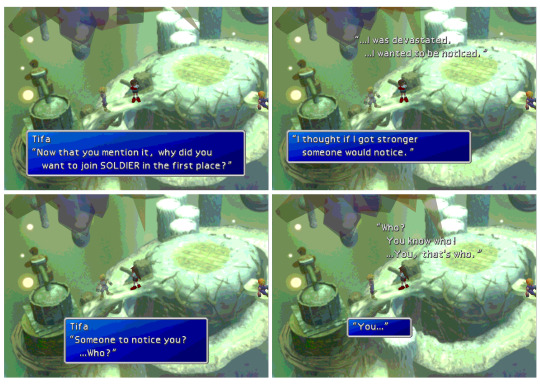
When Tifa is surprised and exclaims why her, Cloud brings up a time in their childhood that she does not recall right away – which he will reveal to be the Mt Nibel bridge incident. Immediately before showing her that memory, ‘little’ Cloud appears (the other manifestation of Cloud’s true self, as I noted earlier). ‘Little’ Cloud invites Tifa into this memory when Tifa engages with “Ex-SOLDIER” Cloud again, who reveals a “A sealed up secret… wish… Tender memories no one can ever know.” This wish is his answer to Tifa’s “Me? Why!?”
Cloud still holding this desire at present is evidenced in that it is “Ex-SOLDIER” Cloud – rather than ‘little’ Cloud – who states this. ‘Little’ Cloud is able to engage with Tifa. Were it his sealed up secret wish alone – something Cloud had only once desired – then he (‘little’ Cloud), not “Ex-SOLDIER” Cloud, would have been the one to tell her.
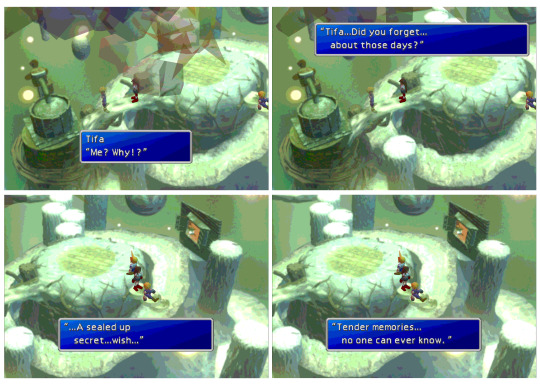
We are then taken to the specific memory of the day Tifa’s mother died and the accident on the Mt. Nibel bridge; the moment Cloud began his obsession with gaining strength in order for that sealed up secret wish to be realized (as he saw it).
I’ve already discussed his feelings of weakness and failure with regard to protecting Tifa. So I will just point out the last screenshot below in light of the sequence before it, where he says “Then even Tifa would have to notice me…”
Tifa being singled out as the “Who” he wanted to be noticed by has already been confirmed. This statement does not alter that exclusivity. Rather, it is Cloud’s affirmation to himself that his goal will be realized through the means of ‘strength’; if he becomes ‘strong’ then he will be acknowledged by others, he will be worthy – and surely then, even Tifa would have to notice him.
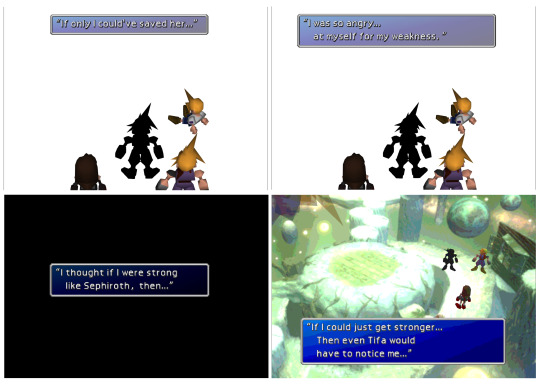
Cloud promised to be Tifa’s personal “hero”. What he has already resolved to strive for becomes a binding, personal promise between them – having resulted from, to his surprise, Tifa’s suggestion. This promise is both the heart of the entire internal plot (saving Cloud) and what brings Cloud and Tifa into the external plot (saving the Planet).
“Hero” to Cloud is synonymous with “SOLDIER”. “Ex-SOLDIER” Cloud therefore feels enabled to keep the promise, and joins AVALANCHE (and the fight for the Planet) with the sole primary purpose, as it had always been, of protecting Tifa.
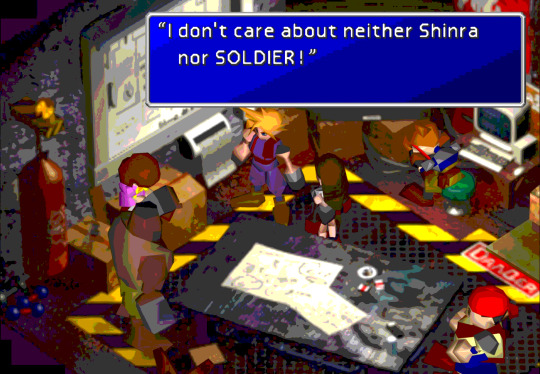
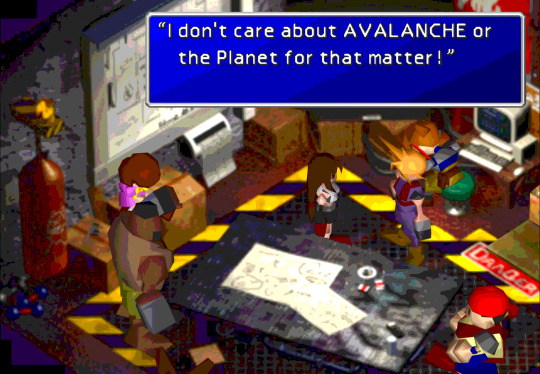
Even while Cloud’s ‘real’ self is trapped in his subconscious and his memory is muddled, Tifa’s uniquely distinct importance to him is enforced throughout “Ex-SOLDIER’s” journey. Alongside this is the emphasis of his reliance on her – that Cloud, striving to be strong for Tifa, sees Tifa as his source of strength.
He hopes in himself because Tifa knew him.
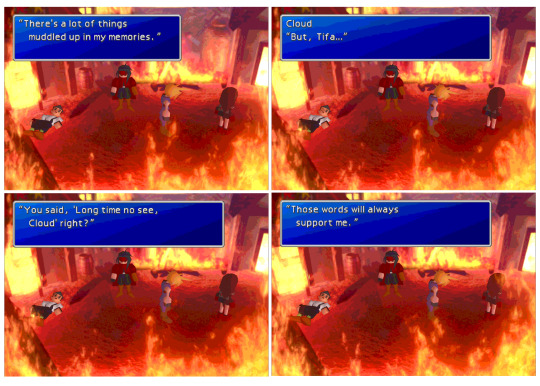
He trusts only Tifa in what is true pertaining to himself.
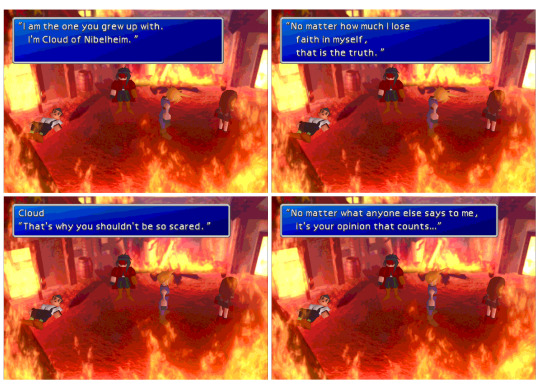
It is when Sephiroth breaks through the trust between them that Cloud’s entire identity shatters (both “Ex-SOLDIER” Cloud and ‘real’ Cloud are lost). Sephiroth plays to Tifa’s confusion surrounding Cloud’s identity and her doubt in her own memories that do not align with Cloud’s. It is when she cannot give Cloud an answer that Sephiroth is able to convince Cloud of the lie that he is not the “Cloud of Nibelheim” she grew up with – synonymous with him not being Cloud the being at all.
Sephiroth, whilst successfully manipulating Cloud, is still threatened by their bond. He keeps an illusion over Cloud where Cloud cannot hear Tifa’s voice as she screams for him to not hand over the Black Materia. Later, Cloud will hear her voice above the cries of all souls within the Lifestream.
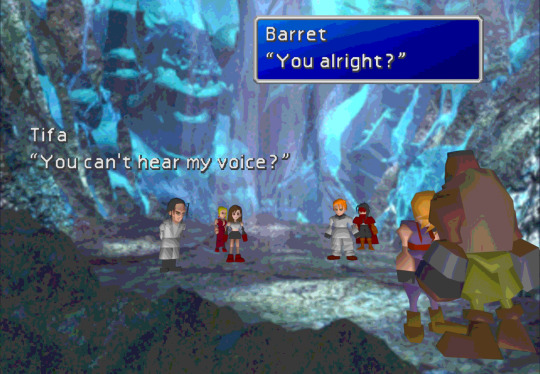
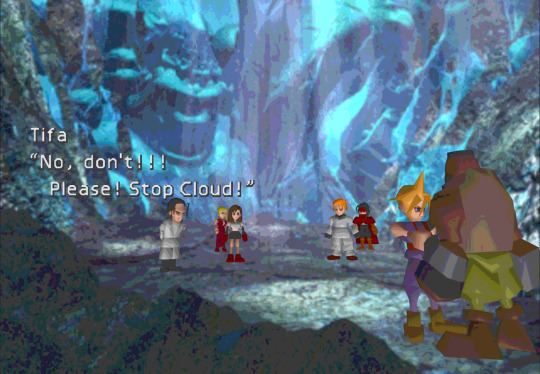
In the Lifestream, Cloud and Tifa cry out to one another simultaneously and Cloud draws her into his subconscious. This is revealed in both versions of their night under the Highwind, and is thus an emphasized plot matter – the big difference being that in the low affection version (see the red textboxes below) Cloud is thinking out loud rather than speaking directly to Tifa.
The English translation is vague in the fourth screenshot (“I think I’ve heard about it too”) – the Japanese being 俺も、聞いたような気がするな (which literally translates to “I feel like I heard it too”). “It” is referring to Tifa’s voice outlaid the fifth screen – “At that time, it was Tifa’s voice…” (あの時、TIFAの声を). Cloud chooses to introspect rather than engage directly with Tifa.
In the high affection version, the same term is used: he says to her that it was her voice (TIFAの声が) calling him from “the sea of consciousness in the Lifestream” (ライフストリームの意識の海から). The English translates this as: “You were calling me back from the consciousness in the Lifestream”, which, in both high and low affection alternatives, refers to all souls within the Lifestream (for Tifa quotes that her and Cloud were “surrounded by all those screams of anguish” when they were separated in their fall).
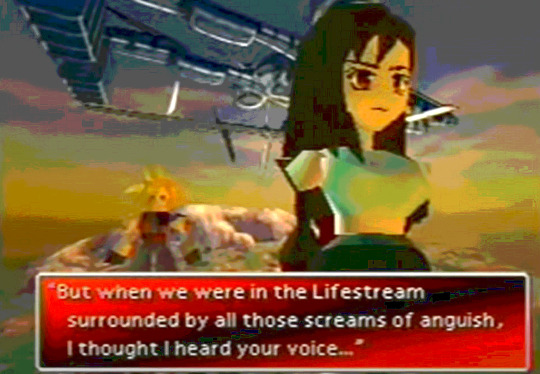
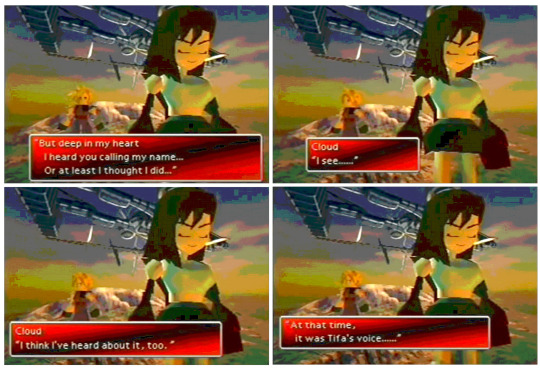
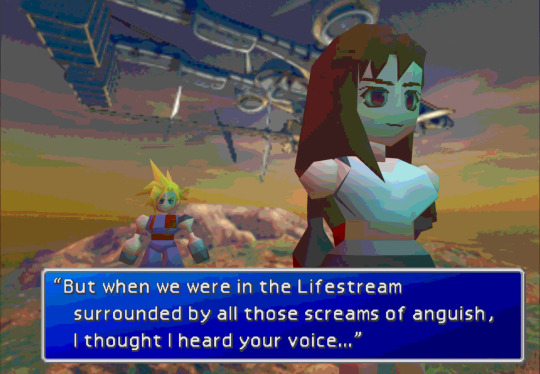
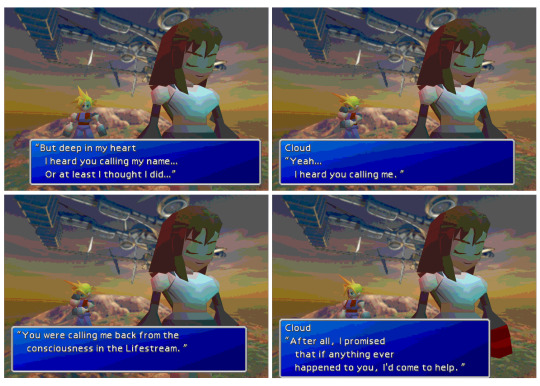
The point I wish to get across is this: that in both versions, Cloud’s subconscious cries out for Tifa and simultaneously hears her crying out for him amidst every scream from those returned to the Lifestream. We see this scene play out not as Cloud, but as Tifa, and the black void emphasizes their complete separation. Yet Cloud, in comatose state, unable to communicate physically at all, manages to draw her into his very subconscious.
Now here is the thing most players miss:
Aerith – as Cloud knows for certain – is also in the Lifestream, and having maintained her full consciousness rather than merging with the Lifestream like all these other souls crying out, would be capable of reaching both Cloud and Tifa more easily than they can reach each other.
Is she aware of their situation? Undoubtedly, she would have been watching over them throughout their entire journey since her passing. Does she somehow help behind the scenes? Quite possibly, and very likely. Aerith is already implied to be the reason Cloud survived the week before he washed up on the shores of Mideel (Cid is told by one of his finders, “That boy must have one powerful guardian angel watchin’ over him”).
So I like to think Aerith had a part in Cloud and Tifa’s survival too – but we’ll leave that one to theory. Just a thought.
Whatever transpired, only Tifa could reach the ‘real’ Cloud, and I have no doubt that Aerith knew this. So Cloud reaches Tifa and Tifa reaches Cloud, with all of their being each crying out for the other.

Now, we come to the long debated ‘scene’ – did Cloud and Tifa make love under the Highwind?
I believe the answer to be, under the high affection version, yes. But that is irrelevant to this discussion of whether their love is romantic – for that experience is not a plot matter (occurring in one narrative alternative), and may operate without Eros or as part of Eros. Of course, in Cloud and Tifa’s case, it would have stemmed from their Eros (my point simply being that it is not a necessary ‘proof’ of their love).
But before considering the high affection alternative, let us turn to what we can find in the low affection scene. The scene also results in Cloud and Tifa sleeping against each other. After they board the airship the next morning, they find Barret, Cid and Red XIII and the following conversation ensues:
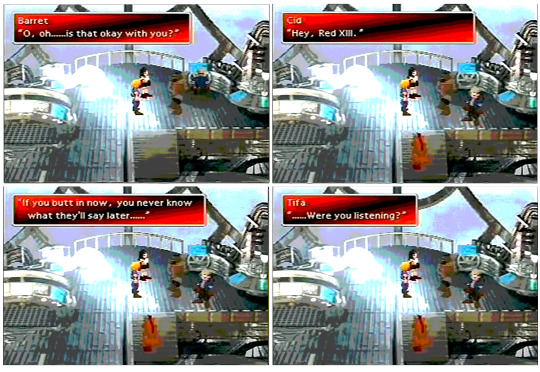
Tifa then runs to the window and faces the other direction in an awkward stance, while Cloud turns away also and scratches the back of his neck. “Were you listening?” If nothing romantic was said at all, as the argument goes, what then is there to make of their embarrassed reactions?
In the high affection version, this conversation with Barret, Cid and Red XIII plays out the same up until the point where Tifa responds. Instead of saying, “Were you listening?” she asks “Were you watching?” and then falls to her knees in embarrassment.
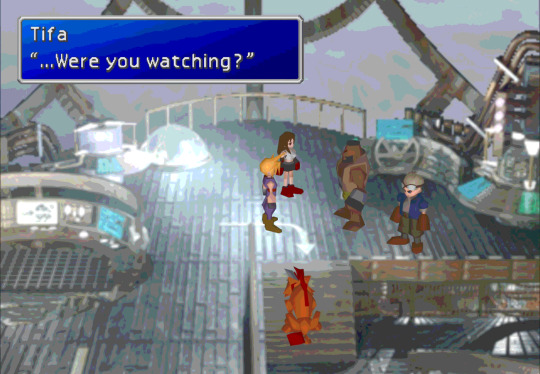
There is a reason there are two versions of this scene and it is not whether Cloud and Tifa ‘get together romantically’ at all. Rather, it is what transpires – according to the player’s agency (for their earlier decisions result in either narrative) – around Cloud and Tifa’s sealing of their romantic relationship (Cloud’s feelings having already been brought to light in the Lifestream):
In the low affection version, they declare it with words (that their friends listen in on).
In the high affection version, they declare it, like they have been declaring it the entire game, through actions (which their friends, to their dismay, end up watching).
Now, with Cloud’s love for Tifa having been openly revealed in the Lifestream, this night under the Highwind is centered on the revelation of her love for him, and upon that love being mutual, the sealing of their relationship. The version the player ends up with is therefore dependent on the affection points earned with Tifa throughout the game.
These points being ‘low’ simply means they do not make love as they do in the high affection alternative, despite high emotions with the impending doom of the Planet. Like Gold Saucer, the narrative can differ. Their love coming together, however, is part of the plot.
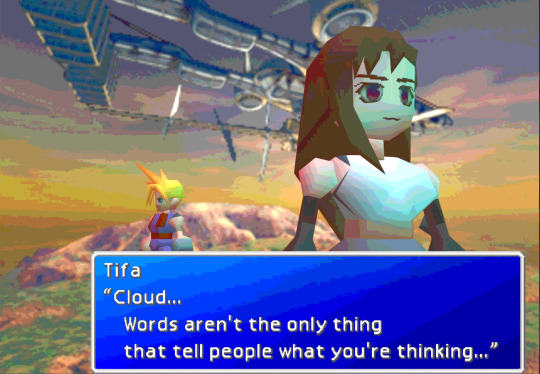
Sephiroth’s manipulations through Tifa’s doubts – the catalyst that caused Cloud’s psyche to shatter – is paralleled in the Lifestream with the restoration of his psyche. After Cloud’s “sealed up secret… wish” is brought to light, Tifa is able to fully overcome her doubts over both Cloud and herself. And it is then that they return to the Nibelheim incident, where Cloud regains his true self. It is when Sephiroth broke Tifa that Cloud broke; it is when Tifa overcomes herself (“You weren’t created five years ago. My childhood memories weren’t all made up!”), that Cloud gains the strength to both recover and accept his true self.
They share a oneness and complete mutual reliance on one another in pertinence to their very personhood.
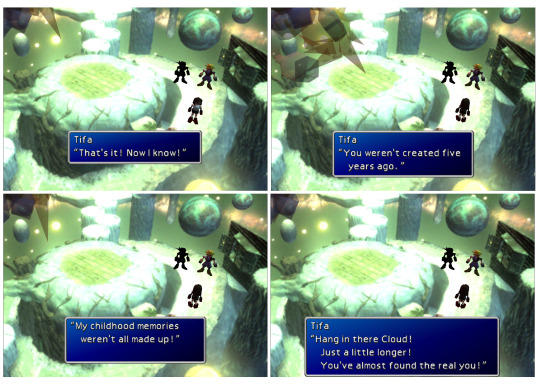
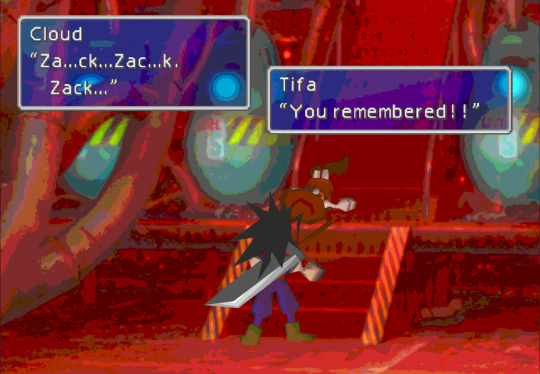

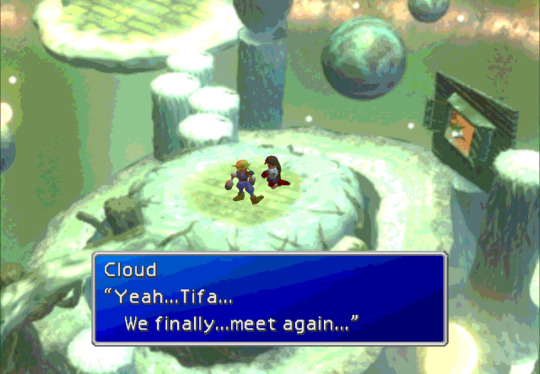
So far runs Cloud’s love for Tifa that it is at the core of his identity. While he cannot recall who he is even within his own subconscious in the Lifestream, his inner voice (true self) recalls Tifa as the motivation at the core of his being.
There is no ‘you and me’ in pertinence to Tifa and Cloud. There is only ‘us’. And alongside this reciprocative Eros (which I will soon examine on Tifa’s part), exists a friendship that surpasses that which Cloud has with anyone else. They are wholly absorbed in each other, and they are side by side in vision. Tifa is his rock as much as he is hers, fighting beside him in every sense of the word; she is his best friend.
Let us now turn to Aerith and Tifa:
https://outbythehighwind.tumblr.com/post/640347336477966336/the-misconceptions-of-ff7-a-cloud-aerith-tifa
#ff7 1997#cloud strife#tifa lockhart#my analyses#cloti#ff7 advent children#ff7 remake#ff7 crisis core
41 notes
·
View notes
Text
Perspectives
Miraculous by Thomas Astruc is a work that proposes many levels of reading. Despite the limits required by an episodic structure, the story offers numerous cultural, narrative and psychological suggestions, which are emphasized through precise directorial and musical choices.

The Miracle Box.
The work is set in Paris, presented in all its beauty thanks to the extremely faithful reconstruction of places, monuments and works of art. The story is inspired by the legends and traditions of Chinese culture, but it also pays homage to cultures from around the world.

The Cathedral of Notre-Dame de Paris.
The plot unwinds thanks to the play of the perspectives of the individual characters, managing to thrill an audience extremely heterogeneous in age and cultural background. The fruition of the work depends on the eyes with which it is observed, regardless of age or emotional age.

Ladybug and Cat Noir observe the city from above.
Children can enjoy a magic fairy tale, becoming passionate about the unpredictable narrative and learning the message of each episode through what the two protagonists learn, a superheroine and a superhero who always fight together to save the victims from the villains.

The heroes complete the mission.
Despite the fact that the children are the declared target audience, the work contains elements aimed at teenage or young adult audience, and themes that are presented with subtle narrative ambiguity to attract other groups of viewers.

The seduction of the sentimonster maneuvered by Mayura.
Teenagers are attracted above all by the sentimental events of the two protagonists in everyday life, they focus on the love drama, real or presumed, sometimes without even fully understanding it, and projecting their experiences and expectations on it.

Adrien's sadness when Marinette denies her feelings for him.
In a continuous swing of more or less fleeting emotions, teenagers imagine the revelation of identities as if the removal of the masks was the beginning of the love story and not the crowning of the emotional path of mutual recognition of the mystery that unites the protagonists.

Trust and waiting.
In other cases they confuse form with substance, obstacles with what the protagonists learn from overcoming obstacles, or they concentrate on the apparently more fulfilling collateral sentimental events, replacing them at the heart of the story, and forgetting the red thread.

The world without Cat Noir.
Adult viewers cannot but be fascinated by identifying the innumerable subtexts, the nuances, the games of perspectives, the metaphors which are used to represent extremely complex themes in a manner that makes them comprehensible even to children.

The absence.
It is possible to recognize the narrative structures typical of magic fairy tales, as outlined by Propp in Morphology of the Tale, despite being expertly camouflaged in the eyes of the viewers through continuous references that involve the functions and roles of the characters.

The reinterpretation of the magic fairy tale.
Perspective becomes the essential key to understanding the differences in the roles of individual characters, without being deceived by appearances and without getting stuck in their superficial representation, often reinforced by a conscious and refined narrative ambiguity.

The deception of appearances.
The narrative structure appears fragmented but hides a subtle and complex game of mirrors, which gives back overlaps and replacements of roles, references and comparisons, creating a series of intertwining to be interpreted through a transversal vision of events and characters.

The triumph of appearances.
It is risky to project the story and psychological motivations of one character onto another to which they do not belong. Even when the roles appear superimposable, the characters do not become interchangeable, do not have the same functions, nor do they have the same emotional depth.

The rewriting of events.
Sometimes a short circuit can occur between what the authors intend to represent and what the public is able to understand. When they fall into the trap of replacements of roles, the protagonists are robbed of their personal story and replaced by impostors.

The stolen identity.
An important aspect of the story is represented by the psychology of the characters, which is deepened not only through the delicate balance of their relationships, but also thanks to the symbolism of the masks and the magical powers that each character controls.

The magic of the masks.
The relationship between Marinette and Adrien, in their various identities, constitutes the beating heart of the story, even when the viewer is led to forget it due to a narrative that focuses only on negative elements and obstacles, blocking their evolution.

The hug before the separation.
In their relationship one can trace the conflict of identity as sense of Self, the discovery of each other's identities as the discovery of their most intimate essence, the mutual awareness that they learn from sharing within an exclusive couple relationship.

The music of their hearts.
The mask is the metaphor of the search of their own identity and the characters' growth. Marinette and Adrien cannot recognize each other beyond the mask because they must learn to know themselves and admit the secrets of their hearts before they can reveal them to each other.

Love beyond masks.
In addition to the psychological complexities of the individual characters, the traits of different types of dysfunctional families are outlined, in the representation of the relationships that extremely problematic parents such as Gabriel, Audrey, Anarka and Tomoe, establish with their respective children.

The triumph of hatred.
In the psychological aspects of the state of akuma (悪 魔, demon) the impulses without brakes or inhibitions of the dark side of a human being are represented. Crossing the thin line between good and evil, the akumatized undergoes a metamorphosis by accepting the pact with Hawk Moth.

The pact with Hawk Moth.
The psychological condition of amok originates from a deep unfulfilled desire or from an intense emotion of despair or fury. Thus a magical creature is generated, a sentimonster, which is the allegory of a dissociative personality disorder where the split personality is perceived as external.

The creation of the sentimonster.
Altered states of consciousness are resolved with the help of Ladybug and Cat Noir. The return to normality often represents the overcoming of the psychological problem that generated the akumatization, but sometimes the mistakes made leave irreversible consequences.

Hawk Moth discovers the heroes' secret identities.
The work is complex and multifaceted, offers numerous insights and infinite narrative possibilities, which represent its strength but which, at the same time, risk revealing critical issues and vulnerabilities when the surprise effect is abused.

The world without love is a world without magic.
21 notes
·
View notes
Text
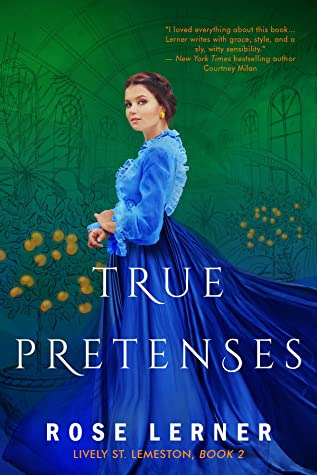
True Pretenses. By Rose Lerner. Self-published (?), 2015.
Rating: 3.5/5 stars
Genre: historical romance
Part of a Series? Yes, Lively St. Lemeston #2
Summary: Through wit and sheer force of will, Ash Cohen raised himself and his younger brother Rafe out of the London slums and made them (in his unbiased opinion) the best confidence men in England. Ash is heartbroken when Rafe decides he wants an honest life, but he vows to give his beloved brother what he wants. When Ash hears of a small-town heiress scrambling to get her hands on the dowry held in trust for when she marries, he plans one last desperate scheme: con her and his brother into falling in love. After all, Rafe deserves the best, and Ash can see at once that captivating, lonely Lydia Reeve is the best. Lydia doesn’t know why she instinctively trusts the humble stranger who talks his way through her front door and into her life. She just knows she’s disappointed when he tries to set her up with his brother. When a terrible family secret comes to light and Rafe disappears, Lydia takes a big risk: she asks Ash to marry her instead. Did Ash choose the perfect wife for his brother…or for himself?
***Full review under the cut.***
Content Warnings: graphic sexual content, references to anti-Semitism, prison and workhouse conditions, poverty
Overview: I think it’s safe to say that Lerner is becoming a favorite author of mine with respect to the romance genre. I was fairly surprised by how much I enjoyed Sweet Disorder, and while I didn’t like True Pretenses quite as much, I still think Lerner deserves credit for the way she handles social commentary in romance. True Pretenses is interesting in that regard for its focus on class issues, as well as for its inclusion of an explicitly Jewish hero. For me, these elements made the character interactions fascinating, and even though I personally found the overall plot a little dull, I think Lerner handled social issues deftly.
Writing: Lerner is very good at crafting prose that flows, building up ideas and conflicts without losing her reader in the process. I liked that topics such as classism and anti-Semitism were portrayed in ways that made them feel like parts of everyday life, so when characters talked about them, nothing felt overly academic or stilted.
Plot: Aside from the romance, the main plot of this book involves Ash and Lydia trying to convince the people around them that they’ve made a love match so as not to cause a scandal. There were parts of this plot I enjoyed; I liked that Ash was able to use his strengths as a swindler to achieve more positive goals, such as currying favor with the townsfolk. I liked that Lydia had to confront a lot of her personal biases and shortcomings in order to live a fulfilling life. And I liked that there was a lot of discussion about class and sibling relationships.
But personally, I would have liked the stakes to be a little higher. Sweet Disorder was a tad more captivating for me because it was set against a tight political race, an unplanned pregnancy, and family drama. While True Pretenses has some family drama, there wasn’t much else to put pressure on the main characters’ relationship. I would have liked to see them face some external challenge together, or perhaps having the plot with Jamie trying to find out more about Ash’s past be a little more prominent throughout the book. Something to keep the suspense going, as opposed to a long struggle with their personal feelings.
Characters: Lydia, our heroine, is a Tory heiress who finds herself without funds following the death of her father. I liked that she was open about her grief and struggled with the impact of her father’s legacy on her life, as well as the way her actions have mainly been in service to others. Her arc can basically be summarized as a woman finding out what she wants for herself, and I enjoyed seeing her grow into a person who wants to do charity not just for political reasons or because it’s expected, but because she wants to use her privilege for good. Her arc was also a nice exploration of how rich people don’t always know what’s right for poor people, and it was satisfying to watch Lydia confront her biases and assumptions throughout the book.
Ash, our hero, is the first explicitly Jewish character I’ve read in a romance novel. I liked that he was Jewish in more than just name - Lerner made Jewishness part of the way Ash navigates the world, and she does a good job balancing the real anti-Semitism of 19th century England with a more optimistic plot (by that I mean she doesn’t wallow in Ash’s misery or try to be edgy). I also liked that Ash’s motivations were understandable without his actions being wholly excused, and part of his arc involved Ash becoming comfortable with letting people in and being comfortable with honesty.
Rafe, Ash’s brother, is also an interesting character in that he’s completely devoted to Ash but wants an honest life. I loved the dynamics between the brothers, including how they disagreed with one another and reacted differently to the same situations, and I loved that Ash had to learn to let Rafe dictate his own life. Jamie, Lydia’s brother, is similarly complex in that he struggles with the expectations of his family legacy. Jamie and Lydia butt heads often, but it’s obvious they care deeply for one another, and I liked the way their sibling relationship paralleled the one between Ash and Rafe.
Other characters were fine, but didn’t serve much purpose other than to flesh out the world. I liked them for the most part, and I think Lerner does a good job of making True Pretenses feel like it takes place in the same town as Sweet Disorder. But other than that, I don’t have too much to say about them. They served their purpose.
Romance: While I really liked the way Ash and Lydia’s relationship allowed for Lerner to explore class dynamics, there was something about it that didn’t quite click for me. Maybe it’s because it felt like Lydia was too comfortable with Ash’s history as a swindler, or maybe I didn’t feel like they were legitimately falling in love with one another (because there was always the possibility that Ash was lying). Whatever the case, the relationship didn’t seem to build or evolve for me.
I also felt like most of the obstacles to the two being a couple came from internal conflict, rather than external. Personally, I don’t really like it when authors use internal conflict because it seems like all that needs to happen is a good sit-down-and-talk for problems to get resolved. It kind of felt like that was the case here; Ash didn’t want to get too attached to Lydia because he’d have to leave her, but he only wanted to leave her to protect her from scandal or something. It was all stuff that involved getting over one’s own hang-ups, and while that can be interesting from a psychological standpoint, I’d much rather see a couple overcome external obstacles together.
TL;DR: Despite me not being a fan of the overall plot and some elements of the romance, True Pretenses is skillfully written and deviates from the norm with an atypical hero and an honest look at class dynamics.
2 notes
·
View notes
Text
Yan Bingyun – An analysis on Wang Juan's adaptation
This is a series of short articles by the same author which will be a 6 part analysis on Xiao Zhan’s various roles.
Part 1.1 – Wei Wuxian
Part 1.2 – Wei Wuxian
Part 1.3 – Wei Wuxian
Part 2.1 – Yan Bingyun
Part 3.1 – Period Dramas
Part 3.2 – Period Dramas
Original Article: https://www.weibo.com/ttarticle/p/show?id=2309404473770331996359 Original Author: 诗债累累

There were a lot of controversy over the character of Yan Bingyun, and part of the reason is because of Xiao Zhan, while another part comes from the script. For those who had read the original novel, they would feel that the character seems slightly different from what they expected.
Before we talk about the actor, let us first discuss my understanding of the character and the script. There is one point that we can make for certain – the changes made to the character, Yan Bingyun, was made to service the script and plot.

Joy of Life is a novel with almost 3.8 million Chinese characters. The content of this novel is rich and the pace is quick, the style of the novel full of intrigues and foreshadowing, as well as independent, yet interlocking, plot lines, linking complex politics and personal motivations. Under layers and layers of intrigue, the author appeared to be playing a puzzle game with his readers by placing in countless surprises – for example, did you know that the genre of this novel is actually science fiction?
Novels are a form of narrative art, and therefore it is able to contain large amounts of information within a chapter, which the readers can reference back and forth. However, if the script were to be written similarly, it might cause confusion among its viewers. Drama is form of action art – the core of action comes from incident, and in order to form incident, conflict and contradiction are the most important. As such, in terms of script formation, it is important it to focus on the main plot line, with clear direction on the lead character’s motivations.
In comparison against novels, the script needs to be as clear as possible, with highly comprehensible direction:
What are the issues to be resolved in these episodes?
Who are our friends? Who are our enemies?
What is this character’s personality?
What must the character do in order to move the plot forward?
With this, we are able to allow the audience to have a God’s view over the entire storyline, and create the effect that only the characters in the drama are caught unaware.
In the novel, Yan Bingyun is a highly complex character, as quoted from the novel:
Fan Xian thought highly of this Mr. Yan, who he had never met, and admired that he was willing to leave behind his riches and fortune, despite being a court official’s son, travel to a faraway foreign land in order to take on the difficult task of spying on the northern borders, and in addition, he did that exceedingly well. Just by the fact that he managed to successfully infiltrate the Northern Qi upper class, Fan Xian knew that Mr. Yan was more outstanding than he was in many ways.
This meant that Yan Bingyun was a high-flyer, being of a high status despite his age, but yet uninvolved in politics, nor indulge in vices; instead, he worked hard, and it showed in his successful management of the spy network. Most people would manage a spy network by secrecy and infiltration, but for him, he did it by openly participating in Northern Qi upper class. He lived extravagantly as a distinguished and admirable member of the society – people knew him as the great talent Mr. Yun; his main opponent’s younger sister fell in love with him. Even when Fan Xian first saw him, he was still handsome despite being under severe torture for half a year.

From the above descriptions, we can see that Yan Bingyun is another “Strong, Beautiful, Tragic” character, and since Xiao Zhan appeared to be a specialist in such, we could say that this was a suitable casting.
Some said that the script adaptation reduced the complexity of the character, but I felt that this was a purposeful change.
(1) To prevent duplication of character type and performance type
The entirety of Joy of Life is a science of contrast and juxtapose in the its portrayal and scenes – important scenes were paired with relaxed performances; climatic conflicts were paired with an everyday setting, for example, when Emperor Qing was having a group lunch with Fan Xian, the Crown Prince and the Second Prince, he openly asked Fan Xian if the Crown Prince or the Second Prince was a better choice.
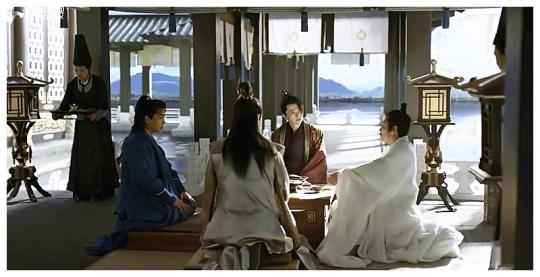
By doing so, it added a layer of dark humor and intrigue in the character, creating complexity, and the actor had the freedom to include their imagination in the scene, for example, in the same lunch scene, the actors were given more space in their portrayal and were able to create their own reactions to that question.
This allowed the entirety of the cast to be also in contrast against Fan Xian. They were scheming, creating mystery and trying to be undecipherable. But Fan Xian quickly understood the rules of the game and attempted to change his fate from a chess piece to the chess player.
Based on the script adaptation, Fan Xian is a very outstanding character – he’s an antihero, not entirely righteous, and very relatable for viewers (who belong to the modern society). He had very strong protagonist halo, he is very practical and very self serving.
This also created a problem, in which the majority of the cast were self serving – Emperor Qing, the Crown Prince, the Second Prince, the Elder Princess, Fan Xian, Wang Qinian. This caused the drama to have a darker tone, more egocentric,and most of the conflicts were internalized, resulting in restrictions in the script. While the story appeared to be attacking human nature, it also seemed to comply with the weaknesses of human nature.
As such, the story needed a more direct character, and this character needed to be acute, direct and aware of the self serving society, but uses above board tactics and stratagems. The line “Everything is for the Great Qing” is a brilliant line, as it brought the conflict in this drama away from a self serving level, and showed that there was a higher level which many continued to fight for.
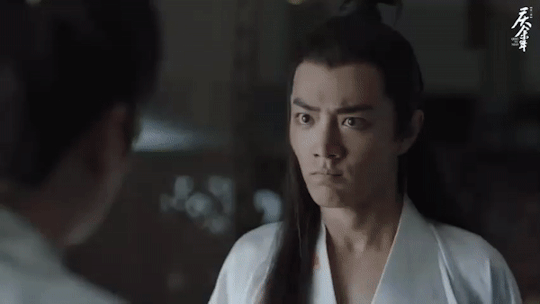
Yan Bingyun was a character who never knew love, but loved deeply (in this case, Qing). This is again in extreme contrast, as the viewers and the characters in the drama would view that Qing is actually a rather lousy country. From the current status, it appeared that his view was to create a revolution from within, spiraling upwards from the bottom to top.
Hence, the Yan Bingyun in the drama became more passionate, more acute; while others were plotting in the dark, he continued to use above board tactics – the only externalized character in the entire drama.
I have created this table for easy understanding:

(2) When grouping up characters, the need to determine character positioning and quadrant
Wang Juan stated in this in a Weibo post: “This character (referring to Yan Bingyun), will need to be part of the team with Fan Xian, Wang Qinian and Gao Da in the future. It would be amusing when these 4 interact, there is probably a need to have greater headspace for this.”
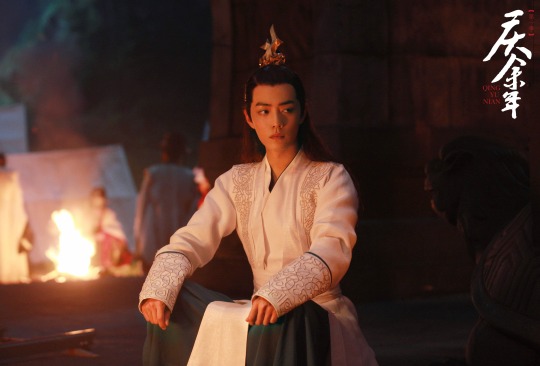
If there were no adjustments to Yan Bingyun’s character, he probably could have completed all the tasks of Fan Xian + Wang Qinian + Gao Da on his own. He knew more about Qing’s internal conflicts, he also understands Northern Qi. While Wang Qinian also had the same clarity, his court position was too low and he had too little influence. And Gao Da’s main task was the fighting force, and for sure, Yan Bingyun could fight as well.
As such, in order to become part of the “crew”, there is a need to weaken his perfect image – a classic example, in the novel, Yan Bingyun built the spy network from scratch, whereas in the drama he took over and managed an existing network.
Zhang Ruoyun said in an interview: “Yan Bingyun is strict, and I am super not-strict, our relationship is a bicker-tease relationship. This understanding is very accurate.”

And we can see this after the changes in his character, we can see the distribution of work in this team of 4:
For the Great Qing: Yan Bingyun > Gao Da > Wang Qinian > Fan Xian
Political strength: Yan Bingyun > Wang Qinian = Fan Xian > Gao Da
Fighting strength: Fan Xian > Gao Da > Yan Bingyun > Wang Qinian
Support required: Fan Xian = Yan Bingyun > Wang Qinian > Gao Da
Before the changes in the character, “For the Great Qing” was a blurry concept, and Yan Bingyun felt mechanical and one dimensional. After the changes, he had more flaws, and as such had greater room for growth. He needed support from this team, and the symbiotic relationship he had with Fan Xian would aid Fan Xian in quickly attaining his goal.

Wang Juan said that to see Yan Bingyun, is to see the emotions that he was unable to contain. We can predict that Yan Bingyun will be of a greater effect in the next arc, with more scenes and character growth. His place in the first arc was just setup for this, and as such, this Yan Bingyun needed not to be perfect.
27 notes
·
View notes
Text
thinking about how buffy uses and depicts buffy and her strength. i’ve always been interested in those little, disturbingly real moments in which buffy’s strength feels suddenly unnatural, even profane. moments that seem intended to reflect buffy’s fears regarding her unnaturalness. that her strength is freakish and alienating. that moment in the body when buffy cracks her mother’s ribs while trying to administer cpr. the moment in the harsh light of day when spike taunts her about “bruis[ing] the boy.” the moment in dead things when she thinks she’s killed katrina with a single punch. same with ted in ted. the sad way she says “i’m gonna win” in conversations with dead people.
there’s also the reverse of this motif, where buffy’s strength is absent or insufficient and it’s terrifying. helpless, of course. her being unable to push a bully away feels uncanny. her inability to beat glory or the ubervamps using physical strength is similarly unsettling.
i’m also thinking about how we get buffy doing casual, almost deadpan shows of strength, but not so much faith. that i can remember–is that right? obviously we see faith fighting, and her accidental murder in bad girls is similar to the ted and dead things scenes. but i’m thinking more about moments like when buffy breaks that door handle in welcome to the hellmouth, leaps over the fence in the harvest, rips the phone off the wall in anne, lifts the troll hammer with ease in the gift, shrugs around giant i-beams in life serial, traps spike with a big stone sarcophagus lid in blood ties and throws riley across the room in a new man.
point is, buffy has a particular relationship to her strength, and the strength imagery seems specific to her character, rather than to being a slayer. it’s notable to me that faith is not one of the villains who is scary because she’s stronger than buffy; to the extent that faith even is scary, she’s scary because she’s as strong as buffy, but with fewer scruples or inhibitions. (seems telling that the show removes faith from helpless entirely, even if there are plot reasons for that. like her role as a foil is that unrelated to strength.)
it’s also interesting that the show has more of these strength moments in the later seasons. in the early seasons buffy being super-strong feels more expository; it’s part of her character and her character’s relationship to power and “normalcy”, but the story doesn’t tend to address strength directly as its own, season-long theme.
whereas season five absolutely does, and arguably more complexly than any other season. you have the parallel between buffy’s inability to beat glory with physical strength, and her inability to beat her mother’s illness with physical strength. both forces threaten to take family away from her. in that vein: her getting bested by the van halen vampire in fool for love, dracula’s un-stake-ability, and the april-bot (“i’ve had it with super-strong little women who aren’t me”). you also have the contrast between the way that buffy’s superior strength, both physically and emotionally, makes her incompatible with riley, makes her feel not-normal in a bad way (also: her fears of becoming “hard”, that strength equals emotional hardness), and the way that she tries to explore the origins of her power, and wants her death to be “a long time from now…like a cheetoh”. in other words, she spends the season feeling at once too strong and not strong enough. for many different definitions of “strong.”
in season six, on the other hand, buffy’s strength is very much connected to her feelings of wrongness. she no longer has something external or heroic to be strong for. just herself. she has dawn, but dawn’s not being chased by a hellgod anymore, and clearly survived the summer without buffy’s help. buffy’s revelation of the season is that she doesn’t “want to protect [dawn] from the word,” she wants to “show it to [her]”—ie, nothing that involves being a super-strong hero for dawn. the nerds are, quite purposefully, seemingly not even a threat. something that, like life, she should be able to bat away. i keep going back to that “freak buffy, too strong for construction work” line. also smashed, which goes to a monstrous feminine place, associating both sex and super-strength with destruction. that building wouldn’t have fallen down if buffy hadn’t had desire, hadn’t been strong, hadn’t felt she was “wrong.” i see season six as being about fear of growing up, fear of things like agency and self-responsibility. fear of being “weak” for not being more together, and fear that being “strong” for your own sake makes you selfish or evil. it’s interesting to me that when she breaks up with spike she says “i need to be strong about this”, and her season-ending display of physical strength is when she pulls herself out of the pit. in other words, her strength goes from being associated with shame and unnaturalness, to being associated with emotional empowerment.
season seven is outright obsessed with strength. once again, the season features villains that buffy can’t really physically fight. either because they’re incorporeal (the first), or seemingly stronger than her (ubervamps, caleb). the word “strong” gets thrown around a lot, along with the mirror word “weak”. the first is described as “evil. the strongest,” buffy is described as “the only one who has the strength to protect” the potentials, spike is described as “the strongest warrior we have.” the shadow men describe the demon spirit thing as “the source of [buffy’s] strength.” also: “weak. and you make me weak,” “chloe was stupid. she was weak”, “our whole race can be so damnably weak” etc. buffy herself uses the word “strong” a lot, especially towards the end: “you’re my strength xander”, “because of the strength you gave me last night”, “this woman is stronger than any of them.” and of course: “are you ready to be strong?” lots more i’m too lazy to detail. it all seems clearly connected to the season’s power themes. the question of what it means to be strong once you’ve accepted that being strong is okay. characters go from being afraid of their strength (i.e. power) to accepting it. spike with his vampirism and willow with her magic. buffy’s melancholy “i’m gonna win” in conversations becomes her “we’re gonna win” in chosen. the season as a whole seems to be about resolving the fear that power/strength is necessarily selfish, shameful, or isolating, and that not wanting to be alone or not being able to accomplish things alone makes you weak.
136 notes
·
View notes
Text
Prayer Focus is important.
The apostle Paul, in Ephesians 6:10–11, wrote words that are worth memorizing and regularly reciting to ourselves: “Be strong in the Lord and in the strength of His might” by putting on the “full armor of God” and thereby becoming “able to stand firm against the schemes of the devil.” And here they are—the needed weapons and protection for actively defeating the real enemy (vv. 14–17)—the belt of truth, the breastplate of righteousness, the shoes of gospel peace, the shield of faith, the helmet of salvation, and the sword of the Spirit, better known as the Word of God. . .
Truth is God’s standard—the unchanging, objective benchmark of the Bible by which we govern and align our lives.
Righteousness means right living—the process by which we apply this truth to our lives and, by His Spirit, produce conduct honoring and pleasing to God.
Peace is the deep, inner, eternal stability the believer possesses by virtue of relationship with Jesus, a sense of balance that’s not subject to external circumstance. It’s also the quality that enables us to live harmoniously with others.
Faith is the application of what one believes—the process of putting feet to our beliefs and living in light of it . . . in practical terms.
Salvation is both our eternal security with Christ, as well as the full inheritance we’ve been given because of our relationship with Him. It includes our blessings, status, and identity—everything we’ve received that enables us to live victoriously for Him.
The Word of God is His present, relevant, personal Word to us for today. The Bible may be an old Book, but God’s Spirit makes it fresh, new, and alive for us.When you resolve to use these weapons—weapons that are “not of the flesh, but divinely powerful for the destruction” of the enemy’s plots (2 Cor. 10:4), you can cut him off at the pass and hit him where it hurts.
And again, the one weapon that ties this whole ensemble together, the one that activates and infuses our armor with the power of God Himself . . . is prayer. Prayer! “Pray at all times in the Spirit,” Paul said (Eph. 6:18). The original word translated “at all times” in this verse is kairos, which refers to specific times, precise occasions, and particular events. In spiritual warfare, as we detect enemy activity and deploy the various pieces of armor, our prayers need to be fervent and specific, strategic and personal, tied to the specific needs arising at that specific occasion. That’s the kind of prayer that energizes the armor of God for maximum effectiveness, prayed “with all perseverance and petition for all the saints” (v. 18). Pray for you. Pray for me. Pray for all of us, he says, that we’ll live with the curtain pulled back, able to spot the real enemy when we see him. And through the bold, mighty name of Jesus, pray that we’ll live with our armor on and not let Satan’s otherworldly forces wreak their havoc in this house, in this heart, on this day. That’s called being focused and strategic in prayer.
Shirer, Priscilla. Fervent (pp. 46-48). B&H Publishing Group. Kindle Edition.
1 note
·
View note
Text
Sweet and deadly - The Hidden Badass trope

Hey there, travelers!
Today’s specimen is a controversial trope I have a love-hate relationship with. When done right, it can create wonders but when creators goof this up, oh boi… This one dooms generic shonen anime series and YA fantasy stories but has the potential to elevate basically every other trope there is-this is the hidden badass.
As the name suggests, the concept is fairly simple: take a shy, introverted and generally plain character and sprinkle on a twist where they show some secret and extremely flashy superpower that nobody knew they had to save the day. We first noticed this recurring element in Japanese cartoons where the titular badass was nearly always a teenage or even younger girl with a sunshine cupcake personality that spurred every viral male protagonist in a mile radius to protect her, just to take over the spotlight when the situation got really messy. Think about Lucy from Elfen Lied, Neliel from Bleach, or more recently Elizabeth from Seven Deadly Sins. At first, both Lory and I thought this to be an anime-only thing, but from that point on, we noticed this more and more in other works of fiction. How?
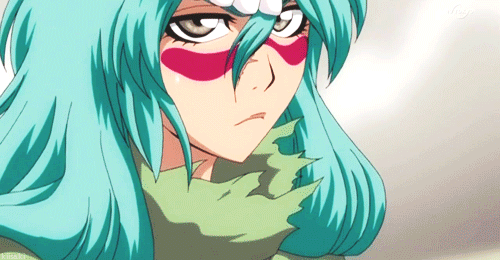
Well, there are a couple of ways creators utilize this trope, ranging from bad to amazing. The anime version sees them mostly as a plot device, a convenient in-world mechanism to solve problems when other options run out. This could happen when a hero is facing an enemy he can’t match for some reason, be it bravery, foolish boldness, or necessity. In these settings changing the story could deter either the protagonist’s character or the plot itself, so an external tool is needed to solve the situation. That doesn’t sound bad in itself, but you can mock this up really quickly.
The easiest way to annoy your reader with this is to stick to the tried out and tested formula without changing a thing. Just recreate the sprinkle cupcake with a war machine split personality, going from harmless to merciless, and push both character traits to their comic limits. You can earn bonus audience hate-points if the hidden badass has telekinetic powers or superhuman instincts and/or speed so they can massacre a military task force.
The second easiest way is to leave this trope hanging after the situation is resolved, assuring the readers that this was solely for convenience’s sake. If you want to avoid these yuckups, you need to integrate the badassery into your world. If a little girl suddenly goes berserk and evaporates an entire city, there will be consequences. Other characters yet unaware of this power will have opinions, their perspective will change and if they aren’t the holy paladin-type, some might even try and make use of this nuclear warhead hidden inside a tiny body. Also, please for the love of God, leave telekinesis out, it’s been done a zillion times. Be creative!
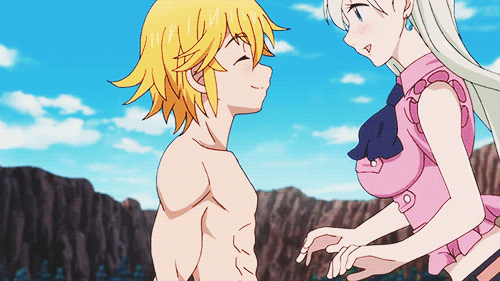
Another reason for this trope is more about the heroes than the titular hidden badass. If this trope character is particularly vulnerable before the great fuck-everything-up moment, the hero might form a sort of defensive personality towards them. You know, the knight in shining armor. Then when the badassery happens they can move on to a power couple situation now on equal footing. This way the start of their relationship is more alike to many young adult romance plots (or at least the older titles in this genre), but it can grow out of the damsel-defender setting. This can be really good if handled carefully.
The main thing here in my opinion is the power balance and consistency. If the titular badass ridiculously outshines the hero it’s just a switch between roles (which can be a great story know that I think of it, just different from our original aim). Also, if the badassery is once-in-a-lifetime, then it falls into the same category as the previous paragraph where it’s painfully obvious it’s just a plot device.
As I mentioned, this trope can amazingly complement a lot of others like it does in many western popular media. My favorite is the coupling of the hidden badass and the outcast tropes in Freeform’s Siren. (Yay, finally!)

For those of you who missed this amazing show, Siren is set in America’s west coast in the fictional town of Bristol Cove, a tourist attraction known as the mermaid capital of the world. However, the local legends get a little too real when a mysterious young girl named Ryn appears in search of her older sister allegedly captured by the humans.
Ryn is a perfect example of how to handle the outcast-badass mix. She’s a mermaid with unnatural physical strength and mesmerizing voice magic that can fry anyone’s brain making the into a lovestruck drooling idiot. Also, because of the clever choice in casting, she looks tiny, adorable, and defenseless. So far nothing deviates too much about the trope, but the show’s brilliance is realism. Ryn as a mermaid knows jack shit about human society, and although she’s a quick study because of her more advanced brain functions, it takes a long ass time until she figures out to wear clothes, why not to kill anyone and how her siren song affects the humans around them. Without the help of marine biologist and lovestruck drooling idiot Ben, she couldn’t step outside and walk for a minute before killing someone and getting herself discovered and hunted like her sister. She is terrifying and powerful, but she needs humans to navigate her through society and eventually reach her goal. This element stays with her throughout the 4 seasons of this show (as of now). Her dissimilarity always and forever means certain benefits but handicaps as well, which creates a feeling that it’s an organic part of the show’s world and not just a plot element to sometimes cause trouble.
There are a lot of other tropes the hidden badass mixes with, like the sexy bad guy or the chosen one, but I think I rambled on for long enough for now. I hope you enjoyed it, and if you have a favorite hidden badass, feel free to share it! Also, what did you think of Siren?I’ll see you next week, stay sharp, travelers! Cheers,Dar
3 notes
·
View notes
Text
on “having it both ways”: thinking about S2 and looking ahead to S3

So apparently once a year I end up latching on to Riverdale pre-season promo and having WAY TOO MUCH to say about it.
Image analysis, pop-culture riffing, S2 criticism, meditations on resistant reading, my own discomfort with “wrongfully accused” narratives in this particular historical moment, and some hopes on the literal eve of the S3 premiere, below the cut...
So, last week when this piece of promo dropped, the very first thing that I thought of was the visual reference to Chicago and the Cell-Block Tango.
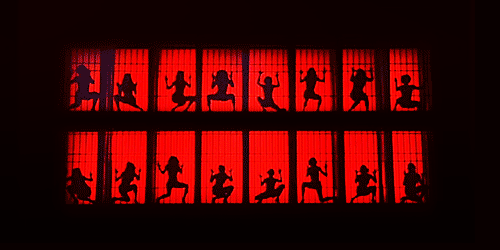
(I didn’t do it! - but if I’d done it? - how could you tell me that I was wrong?)
HOW perfect is that homage? The red lighting, the raised arms? The promo still just FEELS like a snapshot from a Fosse dance routine. (A little more on legendary choreographer Bob Fosse here.)
It’s a defiant pose, right in the center of the frame, but a slightly vulnerable one at the same time. There’s nothing hidden here; everything’s on display. The pose draws the viewer’s eyes inescapably to the body - a muscled body, but one which here seems like a gymnast or dancer’s body: lithe figure, tapered waist, power that is channeled into performance.
youtube
(this is tasty; this is plenty; this is hungry work)
So, on a first pass, insofar as it puts this demonstrative male body on display, it’s a little bit of a subversive image, I think. And that’s well in line with the way that Riverdale so often courts the female (and/or gay male) gaze, and at its best does some really unusual stuff with masculinity.
I thought about all of this - and then, silly me, I saw that this piece of promo was NOT a still, but is, instead, a short clip.
Archie doing pull-ups on the prison bars, as another heavily muscled dude saunters behind him, reads to me like a completely different type of performance! To the degree that it invites the eye, it sends the message: don’t fuck with me. In motion, we have purely the pursuit of greater strength, the purging of weakness in favor of the means of self-protection.
Instead of Chicago, my mind jumps to 3x01′s title source: Fortune and Men’s Eyes. Dominate or be dominated.
Realistically, I’m willing to believe that the ambiguous interpretation here between “still” and clip is just a quirk of how it happened to be uploaded to Twitter by a social media intern.
Still - the interpretative gulf between the still image and the image in motion got me thinking how often Riverdale seems to want to “have it both ways,” and what that does to the audience’s experience and expectations of the show.
For instance:
Other people have written at length about how Riverdale’s pursuit of aesthetic homage or plot contrivance has created character inconsistencies that occasionally baffle. Cheryl is alternately a tragic Gothic heroine and a lacquered, ruthless Mean Girl; Jughead is both a sensitive loner writer and also a bad-boy gang leader; Betty is both Betty and Dark Betty. (GOD.)
Other folks have discussed how the show needs to really play out the consequences of conflicts between the characters. It’s not that the show shouldn’t drop bombshells like the Bughead breakup(s) or the conflict between Betty and Veronica/Jughead and Archie, but it seems all too willing to reset back to milkshakes in a booth at Pop’s without doing enough work to explain WHY things are okay again. (See also: resolving major conflicts between characters literally with a song.)
The desire to “have it both ways” also really shows up in the show’s tendency to engage complicated issues (racism, sexism, colonialism, the prison-industrial complex) on a shallow level - thus getting credit for mentioning them, without really taking the time to explore them meaningfully or to explain the characters’ investment in them.
The result of this, in terms of storytelling, is that you leave a lot of room for resistant (even combative) readings of the text to emerge. To name a few of my own:
frustration with Jughead’s acceptance of what feels like a suuuuper patriarchal role as “the Serpent Prince” (and later King)
the fact that it’s really hard to sympathize with Veronica throughout entire swathes of season 2
a profound opposition to a storyline that sexualizes Betty’s mental health issues in a really exploitative fashion
And then... there’s Archie.
In the “Cell Block Tango,” the murderesses of Chicago (bar one) get to justify their crimes. Conversely, as we open the third season of Riverdale, the audience knows that Archie’s being blamed for something he didn’t do. Despite bragging about it (!!) to a bunch of mobsters (!!!!), Archie is not guilty of the murder of Cassidy Bullock.
...but he IS guilty of so! many! other! things! across Season 2. I’m sure I’m forgetting some, but aiding and abetting a criminal, covering up a murder, blowing up a car, and forming an extralegal vigilante militia group - TWICE - all come to mind.
The last bits of S2 offer us a version of Archie’s amends-making that comes in the form of defending the Serpents, turning on Hiram, supporting his father, et cetera. And then the very last image of S2 - Archie being clapped in cuffs right at the moment that he’s supposed to be sworn into office - is meant to distress us.
But a season of watching Archie embrace fascism leaves some marks, y’all. And a not insignificant portion of the audience, still frustrated with the character’s choices, couldn’t help but say - well, he had it coming.
So, yeah. It’s been a few months between the close of S2 and the open of S3, and in most cases that would be enough time for me to sit with the story in and of itself, to consider more broadly where it had failed or succeeded, and to allow some of that “resistant reader” response to drain away.
But real talk, you guys: I’m finding it really hard right now, at this moment in American history, to connect emotionally with the story of a young man trying to fight the charges of which he has been wrongfully-yet-ever-so-plausibly accused.
[Please note, I am NOT trying to say that RAS is somehow trying to weigh in explicitly on the SCOTUS debacle. The S2 finale laying the groundwork for this plot aired this spring, and S3E1 has (presumably?) been in the can for a while now. And, to its credit, Riverdale has in both seasons explicitly criticized a sexual culture that objectifies young women and reduces them to “points” (the football team’s playbook) and to prey (Nick St. Clair).]
But, for me personally, I can’t help looking at this plot and hearing echoes of “It's a very scary time for young men in America when you can be guilty of something you may not be guilty of.”
Here’s the interesting thing: I think RAS knows this, and I think the promo around this plot is partially designed to try to dispel these connections.
(For me, at least, it’s having mixed results.)

(source)
For instance, I can’t look at this still (young man, formal suit intended to project good character and youthful vulnerability, sullen face, flanked by counsel) without thinking, “Wow, this feels....Brock Turner-y.”
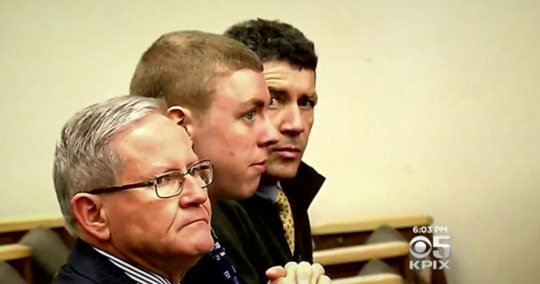
I don’t know if anyone’s written about courtroom photos and sketches as a genre of visual composition, but I feel like I’ve seen variations of the Riverdale still a million times, often printed on the front page of the local university newspaper, discussing the controversy over the conviction (or NON-conviction) of a promising young athlete accused of something awful that no one who knows him EVER would have suspected he would do. (Nice boy, nice family, so many extracurriculars, such good grades!)
Of course, there’s a major difference between the photos above: Archie’s defense team is entirely female.
Obviously this makes sense because Mary Andrews and Sierra McCoy are both major supporting characters who are also lawyers - but it also makes sense in trying to dismantle some of the potential gut reactions to this visual framing. There’s some “innocence by association” going on here, I think. And after all, Archie IS innocent of this particular crime!
This still lands with mixed effect for me though, because any defense strategy that suggests the intentional composition of a visual tableau feels inherently cynical, even when the character is sympathetic or innocent.
For instance: I just watched The Marvelous Mrs. Maisel, which features a scene where the main character shows up in the courtroom in full Upper West Side respectable regalia to try to get the obscenity charges against her dismissed - she fails and ends up having to plead guilty, because she mouths off at the judge. Anyone who’s familiar with Amy Sherman-Palladino’s work will recognize this bones of this plot point in the courtroom scene in Gilmore Girls: Rory’s grandparents’/lawyer’s attempt to portray her as a naive little angel backfires, and she ends up getting a ton of community service as penance for stealing a boat. It’s important to note that the characters are both guilty of their charges - although, as another favorite show of mine might note, “the situation’s a lot more nuanced than that.”)

(source | source)
Another way in which the pre-season promo is distancing Archie from both his actions last season, and the present context external to the show, is to emphasize his profound contrition. In this teaser from Riverdale 3x01, we get Archie declaring that “whatever happens to me in the courtroom on Tuesday - that is what I deserve.” This a statement of universal guilt and responsibility (one might say martyrdom?) that goes well beyond the scope of his actual infractions.
Now - I really, really appreciate that we’re getting a sad Archie rather than a mad Archie. And I want to acknowledge that he’s so definitely a kid here, trying hard to “man up” and to grapple with the fact that he screwed up big time and that there are consequences for his actions. After a season of doing the wrong thing over and over and OVER again, he’s trying to do the right thing.
But here’s the thing: Fred responds to this confession of near-universal guilt with what (in this snippet) feels like a pair of universally-exculpatory statements: “You are a good kid. You got manipulated by a mobster.” (Mary is more nuanced: “You do not deserve to be framed for murder.”)
Archie does not deserve to be framed for murder, and he certainly did get manipulated by a mobster. In fact, I would like to formally start a petition to have Archie not fall under the control of an unscrupulous adult in S3!
However.
Instead of accepting guilt for anything and everything and being immediately absolved for non-specific sins because of his inherent “goodness,” I really want to know that Archie understands what he actually DID do last season. He climbed wholeheartedly on board with the plan to Make Riverdale Great Again, and in that process, he did things that were NOT AT ALL commensurate with being “a good kid.” I think both the character and the show would benefit from a more explicit meditation on exactly why Hiram’s manipulation was so effective, and why Archie moved so quickly past being merely Hiram’s pawn, and voluntarily embraced the role of Hiram’s very ambitious accomplice.
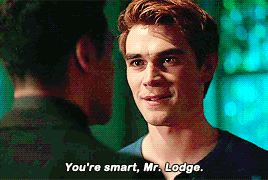
One of the specific preconditions of restorative justice is that the offender has to acknowledge their actions and the hurt that they caused. Reconciliation and vagueness are incompatible for so many reasons, but one of them is because a BIG part of learning from your mistakes is thinking precisely about what you did so that you can choose not to do it again.
I read a bunch of the new Archie comics over the break, and I think I now have a greater appreciation for the trope of Archie as a schlemiel. Despite his best intentions, the Archie archetype keeps making the same goofy, klutzy mistakes over and over again. This is fine, even funny, when it means that Archie just keeps accidentally ending up with a bucket on his head. Whoops!
It is super not okay if it means that Archie just keeps finding himself supporting fascists. ...whoops?
(At present, my entire country is being “manipulated by mobsters.” Clearly, I have some feelings about this.)
I don’t actually know how to wrap all the loose ends of this analysis up meaningfully and coherently at the finish here - but then again, that probably puts me into good company with our showrunners. Optimistically, I’m going to hope that that’s intentional - that I’m judging in media res, and that plotlines and character arcs in S3 will weave together in a way that will surprise and delight me!
But mostly, I’m going to reiterate my hope that S3 makes meaningful choices. That the people in charge don’t waste their actors’ time filming oodles and oodles of material that gets sliced and diced to ribbons. That they make choices EARLY about major plot points; that they stick to them; and that they let the rising action and falling action of your narrative reflect those choices, and the consequences that naturally accompany them.
I hope that the people in charge of S3 will resist the ever-present temptation to “have it both ways” - which ultimately works out to really no definitive way at all. Telling a sturdy story is risky in a totally different way than courting controversy - but it’s so, so worth it.
#riverdale#riverdale meta#riverdale spoilers#archie andrews#us politics#scotus#the urge to overanalyze this image feels like the tug of a Portkey behind my navel#was already a tag#spoiler: resistance was futile#chicago#marvelous mrs maisel#gilmore girls#village-skeptic: back on her bullshit#if you made it through this whole thing I love you to bits!
50 notes
·
View notes